/moviecamera.jpg) Because,
despite my immense appreciation for film, I simply don't have the time to see a
significant number of the latest releases, I'd just like to toss out a few names
of movies that have touched me for whatever reason at one time or another
(including a few currently showing as well as those available on cable or home
video) and suggest that if you haven't seen them already you might want to check
them out...or not!
Because,
despite my immense appreciation for film, I simply don't have the time to see a
significant number of the latest releases, I'd just like to toss out a few names
of movies that have touched me for whatever reason at one time or another
(including a few currently showing as well as those available on cable or home
video) and suggest that if you haven't seen them already you might want to check
them out...or not!
(Note: This is my full review -- merely a condensed version
appears in the June/July '08 issue of Mil
Mania)
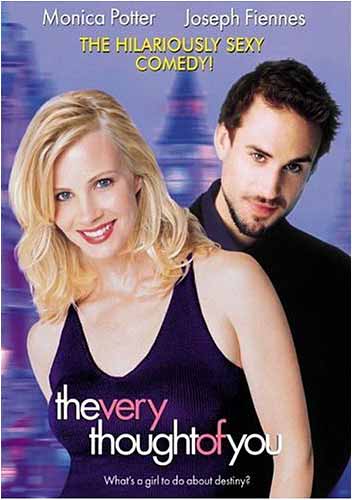 I should probably start by noting I began watching this 1999 film
on TV recently because of a longtime admiration for the work of Joseph
Fiennes. And, indeed, his participation in it did in no way
disappoint. Neither did that of the actors playing his two best
friends -- Tom Hollander (best known previously to me for a delightful
turn as the insufferable Mr. Collins in Pride and Prejudice) and
Rufus Sewell (who I'd seen before as the villain in A Knight's Tale).
Unfortunately, excellent acting can only go so far to cover the
shortcomings of a weak script -- and, beyond question, it's this flaw
that's to blame for my still lamenting two days later what a wonderful
film this could have been.
I should probably start by noting I began watching this 1999 film
on TV recently because of a longtime admiration for the work of Joseph
Fiennes. And, indeed, his participation in it did in no way
disappoint. Neither did that of the actors playing his two best
friends -- Tom Hollander (best known previously to me for a delightful
turn as the insufferable Mr. Collins in Pride and Prejudice) and
Rufus Sewell (who I'd seen before as the villain in A Knight's Tale).
Unfortunately, excellent acting can only go so far to cover the
shortcomings of a weak script -- and, beyond question, it's this flaw
that's to blame for my still lamenting two days later what a wonderful
film this could have been.
That said, it's still one I'm glad to have seen, if
only for the promise provided by the script's strengths -- and, yes,
surprisingly given my prior comment, there were quite a few. In
fact, I'd say the writer (who went on to great acclaim for penning The
Last King of Scotland and The Queen) excelled at "the hard
stuff" yet proved woefully inadequate at what should have been the easier
scenes to write -- and among the most enjoyable (rather than arguably
painful) ones to watch.
More specifically, the plot features some of the most
clever twists one could possibly hope for, and times the reveal of each to
perfection. I must stay rather vague here, in fact, as it's the
series of gradual discoveries that really makes for all the fun.
(With that in mind, I must also provide a warning to avoid any and all
other reviews of this work -- including, most likely the DVD box -- as
they give away what's best not known in advance). What I can tell
you is that the whole misadventure is set in motion when Hollander's
character, Daniel -- a lovably obvious egotist/would-be womanizer --
attempts to pick up a woman who's caught his eye in a Minneapolis airport.
It turns out she's headed to London to start a new life -- wonderful news
to Daniel, who just happens to live in that very city.
Unfortunately, she's booked on a different airline, dashing his hopes of a
long, intimate mid-flight conversation sure to show off his charms and win
her heart. Having (at least access to) more money than good sense,
Daniel alters this clear mis-act of Fate, though not quite setting up the
happily-ever-after scenario he'd envisioned.
While that's less than surprising to the audience, the
question remains why we're hearing about all this from Fiennes' character
after the fact -- via a break-of-dawn visit to an upstairs neighbor he
doesn't even know. I'll leave that explanation, however, for you to
learn when you run across the film one night on your own TV. Again,
I'm not sure it's good enough to recommend you rush out to rent, but if
you have about 90 minutes to spare, I doubt you'll count the time spent
with these fine actors wholly wasted.
To briefly analyze what seems to have gone wrong (from
the perspective of one with a bit of screenwriting experience herself), I
felt the writer didn't really get to know his characters fully before
letting them speak. Daniel, for example, is supposed to be in the
music business -- in some capacity -- but what that capacity is, or why it
took him to MN we never learn. The same applies to Fiennes'
character, who endures a clearly trite and awkward to watch would-be
kissing scene (so stereotypical the two linger centimeters apart with
longing eyes for an eternity, only to be interrupted before lip-lock by
the doorbell (...oooh -- I've never seen that before -- have you?)
Anyway, the point is, if a writer knows his characters well enough, it's
not that hard to just let them start talking and take the scene where it
needs to go. If you've really done your homework, they'll show you
the way. These didn't. The same applies to certain situations
where he needed an excuse to make something happen...such as to switch the
female love interest's airline at the start of the film. Anyone who
could come up with the complex interrelationships of three lifelong
friends, various romantic entanglements, at least a line or two of genuine
wisdom -- and even a fully fleshed out supporting character for the
upstairs neighbor -- surely had the capacity to create a more, well,
creative "coincidence" (or several, as others equally ridiculous occur
throughout the film). I'd say he just got lazy. And, given the
potential to be gained from only a very tiny bit more work, I've got to
say as well that this really is a shame.
Nonetheless, you be the judge. And, if you want a
roadmap of what to do right in a romantic comedy that this writer did
wrong (one starring a British charmer, no less), just watch the film
reviewed below afterwards. Unfortunately, once you do it's doubtful
The Very Thought of You will cross your mind again for a very long
time. Even so, however fleeting this Thought may be, at least
it's a pleasant one...which in itself might just qualify as a gentle
recommendation all its own.
 (This review also appears in the July '07 issue of
Mil Mania.)
(This review also appears in the July '07 issue of
Mil Mania.)
At the time of this film's theatrical release I saw Hugh Grant interviewed on a
late-night talk show, during the course of which he said it was the
favorite film he's made to date. And, I recall wondering then whether this
sounded convincing because he pretty much holds a trademark on charming -- and
disarming -- sincerity, or if he might just be...sincere.
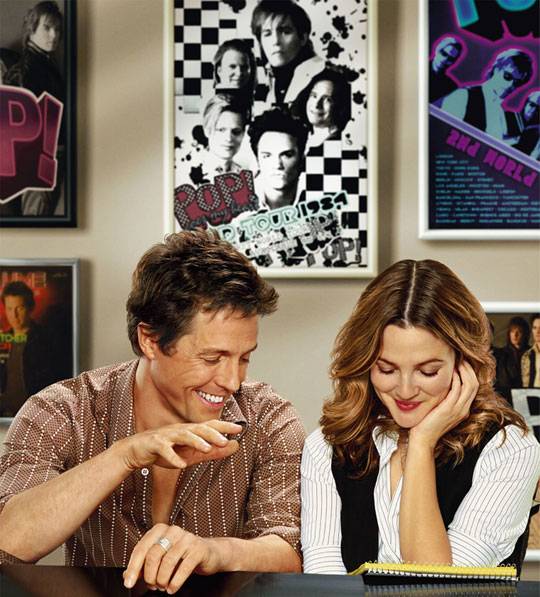 Having now seen the film -- and absolutely loved it -- I
think perhaps the latter is the case. For, while the role itself might not
represent all that great a stretch from the romantic not-quite-heroes he's
played on umpteen prior occasions, the extra demands of it -- specifically
performing a significant portion of the film's soundtrack (and the added
dimension this aspect of the film lends his character) -- may well have provided
a different perspective, and perhaps even surprised him with how full can be the
reward of such a challenge.
Having now seen the film -- and absolutely loved it -- I
think perhaps the latter is the case. For, while the role itself might not
represent all that great a stretch from the romantic not-quite-heroes he's
played on umpteen prior occasions, the extra demands of it -- specifically
performing a significant portion of the film's soundtrack (and the added
dimension this aspect of the film lends his character) -- may well have provided
a different perspective, and perhaps even surprised him with how full can be the
reward of such a challenge.
Of course, part of my own appreciation for the film is
derived from how utterly I relate to the musical portions of the work...for
example, the first attempt by Drew Barrymore's Sophie to sing into a microphone,
knowing the result is being recorded for posterity. Having experienced
this -- complete with her fit of nerves ("my throat's closing up...it's
like anaphylactic...") when recording "How
We Become" I very much related to her character...and to Grant's at a
later point when passion for a subject and a not-to-be-missed deadline combine
to force creative juices to start flowing. I also related to Sophie
in her need to deal very directly with what she saw as an injustice...and the
fear this approach can inspire in one who tries to solve problems in a more
"diplomatic" (i.e. circuitous...cowardly?) manner. You may have
to see the film for those statements to make sense, but once you do I expect you'll find great enjoyment in watching the events they
reference as they unfold.
For those unfamiliar with the film, however, I should
back up here to explain that it revolves around Alex Fletcher (Grant), a former
80's pop superstar attempting to eke out a living by playing his old hits at
theme parks, county fairs and that particularly illustrious music venue, Knott's
Berry Farm....uh, I think, "knott".
It might be argued that Alex's major problem is the
simple fact he's lazy. Rather than move on and make the effort to carve a
new place for himself in both life and the music world, he
 seems determined to
trade on his old success... until it becomes clear the pool of former stars is
ever growing, meaning his own well is rapidly running
dry. It's therefore desperation that forces him to accept the challenge of
creating a new song for a current pop superstar - a blond tween queen heavily
into Buddhism...or more accurately who's learned the appearance of embracing
karma makes her cool...and who could really use a huge hit to keep her
career hot.
seems determined to
trade on his old success... until it becomes clear the pool of former stars is
ever growing, meaning his own well is rapidly running
dry. It's therefore desperation that forces him to accept the challenge of
creating a new song for a current pop superstar - a blond tween queen heavily
into Buddhism...or more accurately who's learned the appearance of embracing
karma makes her cool...and who could really use a huge hit to keep her
career hot.
The problem is Alex has never written lyrics.
And, the early experiments with a pro who's been hired to help him in this
endeavor quickly prove collaboration isn't necessarily the easy way out,
either. Enter Sophie, a friend of his plant waterer, who has taken over
her task for a couple of days. As a side note, it should be added I can't
help feeling sorry for the never seen or later discussed real plant waterer, who
very likely has no business left once Sophie not only completely bungles the
job, but also goes AWOL after Alex overhears her mumbled attempt to correct the
even greater bungling of the hired lyric writer. Be that as it may, she
spends the next 72 hours or so as his semi-willing hostage, and I must confess
that when this period ended I was puzzled at first. Not only did it seem
the film was winding down awfully fast, but it had also to this point presented
a working relationship that was friendly and engaging, but which certainly gave
no indication one was watching a "romantic" comedy.
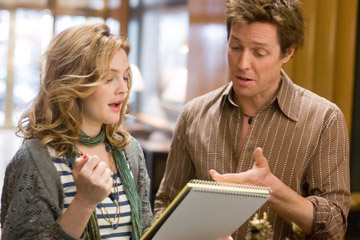
Little did I know, of course, that this is actually where the film
begins...or that by the time it ends it's more than satisfied its billing -- and
(in my opinion, anyway) the audience as well.
I'll leave it to you who haven't seen it to be surprised by all
that follows. What I will add, however, is that the video which opens the
film -- a wonderfully cheesy 80's-type concoction entitled, "Pop Goes My
Heart"...and which reappears in equally satisfying form as a "pop-up
video" at the end -- is alone worth the price of the rental...as is the
performance of another song Hugh Grant performs in between. There are also
many smartly witty one-liners and excellent performances by Brad Garrett and
Kristen Johnson....not to mention those by both Grant and Barrymore.
As Sophie explains, music is like the first spark of
attraction, while lyrics are the means of becoming more deeply acquainted.
And, indeed, this is a film that lives up to its title by providing both instant
appeal and lasting appreciation. Check it out for yourself and see if it's
not a cinematic love song you want to keep singing -- and seeing -- again and
again.

I have to admit right up front that this review is likely to prove as confusing
as the film it talks about -- mainly because (confusing statement in itself) I want
so much for the sum of the whole to add up to at least something close to its
parts. Depending on how you look at it, it does....and yet, not really.
It's a fitting metaphor that at one point
there's a discussion of Jane Austen's Persuasion as both a
beloved book and one that's "terrible". Based on that
analysis, maybe the filmmakers should have just called this a
re-imagining of that work and been done with it. But, I'll try to
explain my take on what they chose to do instead.
When I first saw ads for The Lake House upon its release to
theaters I recall being unable to get my head around the premise of a love story
in which the protagonists are "living two years apart". How could that be? Could that be at all -- or
more importantly -- could that be made believable for even the space of less
than two hours time? The problem is, while watching the movie on DVD, I still
couldn't get my head around the concept...mainly because it's impossible to
keep one's brain from trying to make sense of what's going on even though one
realizes there's no such sense to be made. Of course, under normal
circumstances, this wouldn't present a problem at all; I'd shut off the DVD
player and return the obvious dud to the video store. In an instance where the main characters have such inherent chemistry and are just so
downright likable, however, one keeps trying and trying and trying to work it all
out... as do the characters themselves. The real problem, when all
is said and done, therefore, lies in the fact they've gone an awfully long way
and waited an awfully long time to move beyond a heartbreak one of them manages
to solve only after making the discovery of having inadvertently created
it....which means, of course, we've all put up with a lot of unnecessary
pain and fear and loss and rediscovery...for which we could look back with a lot
less forgiveness than the lover who -- for a while -- got the short end of this
stick.
To briefly explain the unexplainable, Sandra Bullock
plays Chicago doctor Kate Forster who moves out of a North Shore lake house,
leaving a note for the next tenant (architect Alex Wyler, played by Keanu Reeves). The resulting
complication is the fact she's moved out in 2006; he moves in in 2004...a
circumstance which only gradually dawns through a series of impossible realities
such as the apartment building Kate gives as her
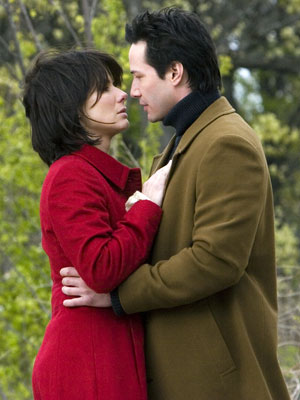 forwarding address proving a
construction site not scheduled to be completed for another 18
months.
forwarding address proving a
construction site not scheduled to be completed for another 18
months.
The upside of this dilemma, once they both come to
grips with it as more than some practical joke, is that it allows Kate to
revisit through Alex's eyes both a prior relationship with another man, and
prior meetings she's unwittingly had with him...setting the stage for some
truly touching romantic gestures and the metaphors that arguably salvage the
film in retrospect -- if, that is, you're on the side of its salvation proving
any more possible than the circumstances of its plot.
Ultimately, the biggest problems I have are believing
Kate so bad at recalling faces that she forgets those of not one, but two
of the most significant men in her life...and the minor wrinkle of how her
experiences two years ahead of Alex can help him change where he will be when he
"catches up", but ignores how the different moves he makes will cause
others around him to likewise be in places other than they are when Kate meets
them up ahead before he's altered course. Not to mention, by the
way, what the heck is up with that dog?!? And, to all of that I
can only second Roger Ebert's advice regarding so much of the film..."Never
mind."
The thing to keep in mind is that Ebert actually
liked The Lake House...as part of me ( is more than half-ashamed to admit) does
as well. Given one can't help wanting the protagonists to live happily
ever after, it's a natural reaction to find underlying beauty in how
they get there. That leaves one to ponder if the creators of the
film weren't trying to make creative statements regarding the timeless
nature of true love, it's ability to transcend even the most impossible
odds, and its durability when put to the test of time. Looked at
in this way, I suppose one can appreciate the new take on these themes
they chose to give it. Just don't look too hard. Straining
your eyes to that degree can give you a real headache...as can this
film. Watch at your own risk. Just don't look to me for any
clues as to whether you might enjoy it. After all, when it comes
to that point, I think I've made it clear I'm still pretty confused
myself.
 Based on the Oscar Wilde play Lady Windermere's Fan, my husband
and I rented this title because of our appreciation of several prior
works featuring Scarlett Johanssen (perhaps most notably among them t
Based on the Oscar Wilde play Lady Windermere's Fan, my husband
and I rented this title because of our appreciation of several prior
works featuring Scarlett Johanssen (perhaps most notably among them t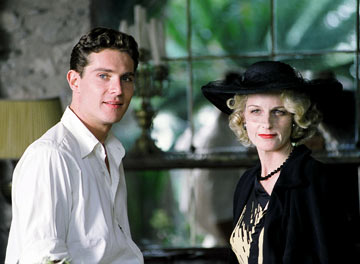 he
truly stellar A Love Song For Bobby Long). And, once more
we were not disappointed by either Johannsen or the film itself.
Very well acted and cleverly plotted, the story begins with Mrs. Erlynn
(an excellent Helen Hunt) being "punished' for her "sins"
as we learn the wives of her -- uh, "expense account
providers" -- have cut her off financially, forcing her to seek
"new arrangements" in fields afar. Given the obvious
manner in which she has existed to date, it seems far too easy to draw
very dark conclusions when her port of choice becomes the region of
Europe wherein Lady Windermere (Johanssen) has taken up residence with
her new husband -- a gentlemen who soon becomes the center of the
region's gossip circles when he's seen repeatedly entering and leaving
Mrs. Erlynn's villa...and it's later discovered there has been an
ongoing exchange of
he
truly stellar A Love Song For Bobby Long). And, once more
we were not disappointed by either Johannsen or the film itself.
Very well acted and cleverly plotted, the story begins with Mrs. Erlynn
(an excellent Helen Hunt) being "punished' for her "sins"
as we learn the wives of her -- uh, "expense account
providers" -- have cut her off financially, forcing her to seek
"new arrangements" in fields afar. Given the obvious
manner in which she has existed to date, it seems far too easy to draw
very dark conclusions when her port of choice becomes the region of
Europe wherein Lady Windermere (Johanssen) has taken up residence with
her new husband -- a gentlemen who soon becomes the center of the
region's gossip circles when he's seen repeatedly entering and leaving
Mrs. Erlynn's villa...and it's later discovered there has been an
ongoing exchange of 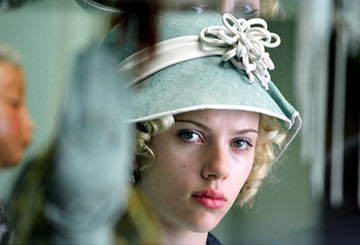 funds
involved in these "transactions".
funds
involved in these "transactions".
The beauty of the writing -- laced throughout
with Wilde's signature twisting of the English language to marvelous
effect -- lies in its own twists and turns that play on the viewer's
expectations, gradually convincing us nothing is as it seems...at the
same time convincing the players in the story everything is far
too appallingly just that.
I won't spoil the ending for you by revealing
how these often scandalous goings-on are at last resolved, though I will
tell you that the film's magic endures from the first frame to the last,
and although it's hardly material that makes for blockbuster status on
the big screen, I truly believe you'll have missed out on something very
special if you let it disappear from your local video store's shelf
before learning for yourself just how "good" this
"woman" really is.
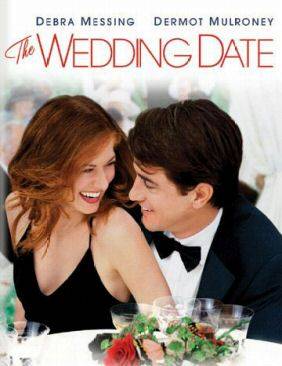
Sure, it's a given circumstance that romantic comedies in general don't
exactly mirror real-life situations, and a storyline centered around a
single woman finding love in the form of a male escort hired to masquerade
as her new boyfriend at her sister's wedding -- in which the best man just
happens to be her ex-fiance (who she wishes to inflame with jealousy,
while convincing her family she's moved on in a happy and healthy
direction) -- hardly proves the exception. However, it's also a
given circumstance that the audience going to see such a film is willing
to suspend their disbelief for its duration, thereby allowing the
experience to become a potentially enjoyable one...and one from which some
very real truth may be plucked from the pretend world of its multi-layered
fictions.
Of course, when you throw in two such highly
competent players as Dermot Mulroney (the real standout in the film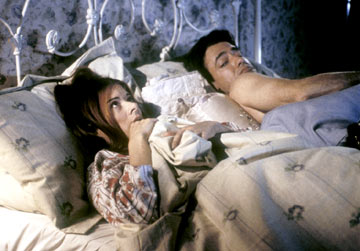 for me) and Debra Messing, well, the chances of potential enjoyment
greatly increase. And, from my perspective in any case, that
potential is indeed fulfilled.
for me) and Debra Messing, well, the chances of potential enjoyment
greatly increase. And, from my perspective in any case, that
potential is indeed fulfilled.
As you know from other reviews on this page, I
often disagree with professional film critics -- and have notably
disagreed with Roger Ebert in particular. In this instance, though,
I believe he echoed my sentiments so exactly that it seems pointless for
me to
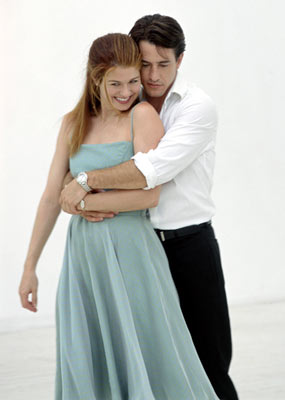 re-state
them. He said, "Part of the movie's appeal comes from the way the
Nick character [Mulroney] negotiates the absurdities of the plot as
if he stands outside it... By withdrawing, so to speak, he creates a
great curiosity about himself, and the other characters see in him what
they need to see. As for Messing [the female lead, Kat]... we want
her to be happy."
re-state
them. He said, "Part of the movie's appeal comes from the way the
Nick character [Mulroney] negotiates the absurdities of the plot as
if he stands outside it... By withdrawing, so to speak, he creates a
great curiosity about himself, and the other characters see in him what
they need to see. As for Messing [the female lead, Kat]... we want
her to be happy."
What's more, while much of the plot is
constructed in a fairly formulaic way, there are several of those little
dialogue nuggets sure to make every writer smile -- and every hopeless
romantic happily sigh...and, although it's hugely tempting to recount them
here, I'll refrain from robbing newcomers to this film from the joy of
hearing them for the first time; those of you who've already seen it
surely don't need me to remind you what they are.
There is one troubling aspect to me, however, with
regard to resolution of the bride and groom supporting characters'
sub-plot, and the fact that a wedding indeed takes place after certain
disturbing revelations. But, as in other dramatic productions which
supposedly deliver happy endings (that of the Hero and Claudio characters
in Much Ado About Nothing, for example), it's left to the
imagination of each member of the audience whether this happiness
continues "ever after".
It doesn't take much imagination, however, to
believe Kat and Nick will be just fine. And, I dare you not to smile
"ever after" at the memory of their happiness...not to
mention your own joy from having met them.

Having first encountered
this film's star, Bill Nighy, in Love Actually, via his role as a
rather crude and offbeat aging music star (albeit ultimately a rather
touching performance by that film's end), I must confess I both avoided
this title as a rental based largely on that image of him...and also felt
compelled by curiosity to watch when I encountered it flipping through the
cable channels on TV a few nights back.
What's more, I must admit as well that the odd
pairing of both characters and subject matter -- a May-December romance
set against the backdrop of the G8 summit in Reykjavik, Iceland -- hardly
makes for gripping copy on the back of the film's video store
packaging. Of course, that's where the ancient adage, "Don't
judge a book [or movie] by its cover" clearly fits in. Because
once I started watching, I was already utterly charmed and intrigued
before even the opening scene itself had reached its end. Not only did
both Nighy and co-star Kelly MacDonald very quickly win the viewer over
with their respective forms of quirky vulnerability, Nighy's Lawrence in
particular created such a moving portrait of a shy yet deeply feeling
individual's uncertainty and longing, that one couldn't help but begin
rooting for him to indeed find love and fulfillment by pursuing the
fledgling glimmer of possibility represented by MacDonald's Gina.
Ironically, I happened to be watching this while
on a break from putting together the January '06 issue of Mil Mania,
which if you're a subscribe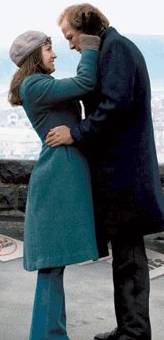 r
you already know includes an essay called, "If You Think Names Don't
Matter, Yours Isn't Mildred" -- a piece I'll admit I was a bit
hesitant to publish as I'm not sure how many other people would find such
a topic at all relatable or amusing. Needless to say, I was
therefore both comforted and amused myself, to find Lawrence explaining on
a first date over dinner that his father had come from Italy, where he'd
lived with an aunt named Zeppa. Going on to point out he grew up to
marry a woman named Myrtle, who'd had a dad named Horace, he stops to
ruefully observe, "Christ, what an unlucky generation that
was." Yes, Lawrence, I hear you!
r
you already know includes an essay called, "If You Think Names Don't
Matter, Yours Isn't Mildred" -- a piece I'll admit I was a bit
hesitant to publish as I'm not sure how many other people would find such
a topic at all relatable or amusing. Needless to say, I was
therefore both comforted and amused myself, to find Lawrence explaining on
a first date over dinner that his father had come from Italy, where he'd
lived with an aunt named Zeppa. Going on to point out he grew up to
marry a woman named Myrtle, who'd had a dad named Horace, he stops to
ruefully observe, "Christ, what an unlucky generation that
was." Yes, Lawrence, I hear you!
Be that as it may, this deeply affecting,
burgeoning romance, which predominates the gently comedic first half of
the film shifts to a focus on the aforementioned G8 summit in the second.
And as it does, the growing bond between the couple is questioned and
tested as bits of Gina's past begin surfacing in arguably ill-conceived
moments -- spawning an odd mix of discomfort and admiration on the part of
both Lawrence and those heading his country's G8 negotiations. And,
while this effectively switches the tone away from anything close to
funny, yet it proves not at all jarring or disjointed in service to prior
events, in that it builds upon them to bring about awakening of the
realization that perhaps these potentially powerful men have so long
practiced the art of "compromising" that they've become
"compromised" -- and that they "are not" the men they
"had dreamed [they] would be when [they were]
young."
I'll leave it to you to learn whether they become
those men or not, and what becomes of Lawrence and Gina's relationship,
when you watch this film yourself -- something I very highly recommend you
do. In the meantime, I will add only that I found this among the
most lovely and artful examples I've seen in quite some time of not
merely, "accepting the things we cannot change", but more
importantly, "finding the courage to change the ones we can." --
and, most notably, confronting the final part of that prayer's admonition
with the challenge that what constitutes "the wisdom to know the
difference" may in fact depend on precisely what we hope to
achieve -- and who we most hope to benefit -- by that distinction.
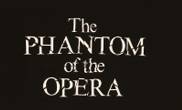 NEW!!! Given
the fact it's now the longest running show in Broadway history, it would seem
I'm among the last people on Earth to have known next to nothing about The
Phantom of the Opera prior to watching this 2004 film. And, of course,
if you've been keeping up with my other reviews on this page for the past few
years, you may already be aware of a comment I made regarding Moulin Rouge
-- one which, to be honest, is quite characteristic of my usual opinion of the
musical theater genre. In it I said, "I always find the unnatural vehicle of almost solely
musical
NEW!!! Given
the fact it's now the longest running show in Broadway history, it would seem
I'm among the last people on Earth to have known next to nothing about The
Phantom of the Opera prior to watching this 2004 film. And, of course,
if you've been keeping up with my other reviews on this page for the past few
years, you may already be aware of a comment I made regarding Moulin Rouge
-- one which, to be honest, is quite characteristic of my usual opinion of the
musical theater genre. In it I said, "I always find the unnatural vehicle of almost solely
musical 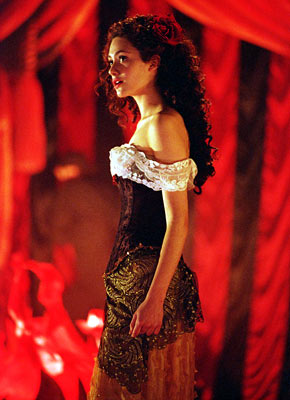 speech a bit off-putting",
and I will without hesitation tell you that for at least the first half-hour or
so of this (to me new) example of the form, it proved by no means an
exception. In fact, I was so thoroughly frustrated with the "unreal
seriousness" of the whole thing at the point wherein the heroine is shown
kneeling to light a candle in remembrance of her late father -- her billowing
hoop skirt so meticulously arranged without the slightest wrinkle of disarray,
every perfectly coiffed tress intact as it falls against her powdered porcelain
skin...despite the fact this all follows a performance one can't help realizing
would most certainly have at least worked up a bead of sweat or caused one or
two of those angelic strands of ringleted gossamer to blow astray -- that I have
to fess up to the fact my hand started wandering toward the remote beside me in
a plea to end once and for all this groan-inspiring assault on my reason.
However, always
speech a bit off-putting",
and I will without hesitation tell you that for at least the first half-hour or
so of this (to me new) example of the form, it proved by no means an
exception. In fact, I was so thoroughly frustrated with the "unreal
seriousness" of the whole thing at the point wherein the heroine is shown
kneeling to light a candle in remembrance of her late father -- her billowing
hoop skirt so meticulously arranged without the slightest wrinkle of disarray,
every perfectly coiffed tress intact as it falls against her powdered porcelain
skin...despite the fact this all follows a performance one can't help realizing
would most certainly have at least worked up a bead of sweat or caused one or
two of those angelic strands of ringleted gossamer to blow astray -- that I have
to fess up to the fact my hand started wandering toward the remote beside me in
a plea to end once and for all this groan-inspiring assault on my reason.
However, always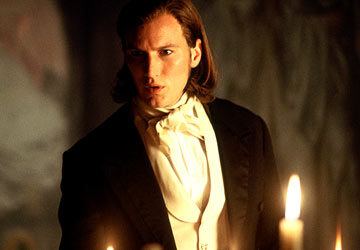 hopeful things might improve with perseverance, I managed to successfully
contain that urge, and soldiered on. And, once the title character showed
up to balance out the hard to swallow milktoast Raoul we're expected to believe
is Christine's once childhood crush (and now potentially great
love...?!&*^&*?) -- indeed things began to (quite literally, as it often
happened throughout the rest of the show) look up.
hopeful things might improve with perseverance, I managed to successfully
contain that urge, and soldiered on. And, once the title character showed
up to balance out the hard to swallow milktoast Raoul we're expected to believe
is Christine's once childhood crush (and now potentially great
love...?!&*^&*?) -- indeed things began to (quite literally, as it often
happened throughout the rest of the show) look up.
I've read reviews criticizing the production for its
casting of a far from grotesque figure to portray what was apparently in the
original novel by Gaston Leroux a hideous and loathsome creature. Given
the simplistic plot and dramatic appeal of the modern version, however, relies
primarily on a love triangle between the Phantom, Christine and Raoul, it would
hardly seem plausible that this lovely, talented young woman might be r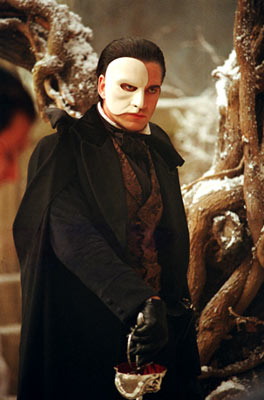 omantically
drawn to something with bulging eye sockets in excess of 60 years age. In
light of the aforementioned assessment of Raoul's own questionable appeal,
however, it becomes pretty easy to believe that a patron of the arts with
excellent taste and a fair bit of talent in his own right -- albeit with a bit
of (disguisable) facial deformity -- could prove a worthy contender in
wooing the lass. And so, at last, we have a film.
omantically
drawn to something with bulging eye sockets in excess of 60 years age. In
light of the aforementioned assessment of Raoul's own questionable appeal,
however, it becomes pretty easy to believe that a patron of the arts with
excellent taste and a fair bit of talent in his own right -- albeit with a bit
of (disguisable) facial deformity -- could prove a worthy contender in
wooing the lass. And so, at last, we have a film.
And, of course, if one adds murder to the mix, the ever
looming sense of tragedy lurking just around the bend, and the genuine
uncertainty as to where it all may lead, the overall spectacle becomes a rather
engrossing one. What's more the skillful use of lighting effects, color
blooming from black and white transitions, and sets that are truly breathtaking
in their beauty and atmospheric qualities as metaphor, one can't help but marvel
at the visual as well as emotional artistry of the production as a whole.
Be that as it may, I suppose in the end it all comes
down to the fact I'm eternally a sucker for hopeless romanticism, whatever the
contrivances used to tug at those heartstrings. And, in the case of Phantom
of the Opera, the primary reason I'm ultimately championing it here is the
frame tale in which its set...a tale which occupies only a tiny fraction of the
film's more than two-hour running time, but which creates a snow and dust-filled
world of shadows that contain the brightest colors of the entire
"show". And, indeed, in a fine example of saving the best for
last, it is the final silent image we are left with that speaks the
loudest. For, although the "words" of that image are undeniably
bittersweet, yet they also serve as a most eloquent reminder that "silence
is the perfectest herald of joy"...and that the beauty of enduring love
remains endlessly -- and timelessly -- appealing.
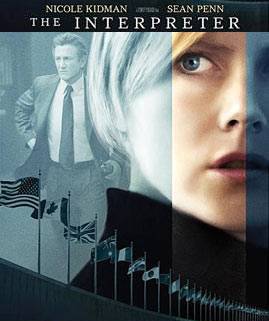 Part political thriller, part personal human drama, it's the former of these
which most likely sold The Interpreter at the box office...but it's
undoubtedly the latter which sold me on it as a worthy selection to review --
and, more importantly, recommend -- here on this page.
Part political thriller, part personal human drama, it's the former of these
which most likely sold The Interpreter at the box office...but it's
undoubtedly the latter which sold me on it as a worthy selection to review --
and, more importantly, recommend -- here on this page.
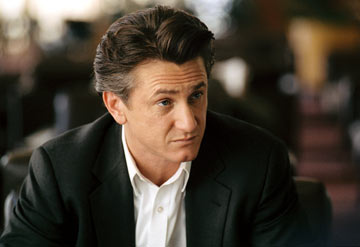 As
you've probably seen in TV ads for the film, the basic storyline involves a
potential assassination plot overheard by a U.N. interpreter, and subsequently
reported to the proper authorities. While this results in secret service
agent Tobin Keller (Sean Penn) being assigned to protect the foreign dignitary
believed to be in danger, his focus soon shifts to Sylvia Broome (Nicole
Kidman)...the interpreter who made the report, and who happens to also be a
woman carrying a host of grief and secrets -- circumstances Tobin himself
relates to all too well.
As
you've probably seen in TV ads for the film, the basic storyline involves a
potential assassination plot overheard by a U.N. interpreter, and subsequently
reported to the proper authorities. While this results in secret service
agent Tobin Keller (Sean Penn) being assigned to protect the foreign dignitary
believed to be in danger, his focus soon shifts to Sylvia Broome (Nicole
Kidman)...the interpreter who made the report, and who happens to also be a
woman carrying a host of grief and secrets -- circumstances Tobin himself
relates to all too well.
It is this shared experience, therefore, which creates
the emotional center of the picture, and allows for the brilliant Penn to
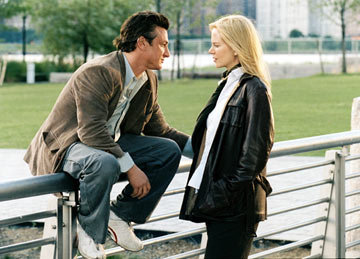 showcase
his uncannily real understanding of and caring for Sylvia's own feelings -- an
understanding most notably displayed in a particularly moving (and well-written)
scene which takes place on a park bench late in the film...the dialogue from
which I would very much like to quote here; however, as I don't want to spoil
the impact as it unfolds before the listener, I will leave its few brief, but
unforgettable lines to be experienced for yourself.
showcase
his uncannily real understanding of and caring for Sylvia's own feelings -- an
understanding most notably displayed in a particularly moving (and well-written)
scene which takes place on a park bench late in the film...the dialogue from
which I would very much like to quote here; however, as I don't want to spoil
the impact as it unfolds before the listener, I will leave its few brief, but
unforgettable lines to be experienced for yourself.
With that in mind, I'm keeping this review far shorter
than is my custom. So much of this film builds on discoveries made along
the way, and the balance of trust in an individual you "know" versus
all you know about that individual, that to reveal too many details in advance
would undoubtedly tip the scales in a direction most unfair to the new
viewer. I will therefore add only that I enjoyed this film immensely, and
indeed encourage you to go see it yourself -- today!!!

Before getting to the actual "review" of this particular film, I have
to explain briefly a couple of related points. First, I realize it's extremely odd that I'm only now discovering a film that's been around for a
decade and a half -- one, incidentally, I'd first heard of several years back 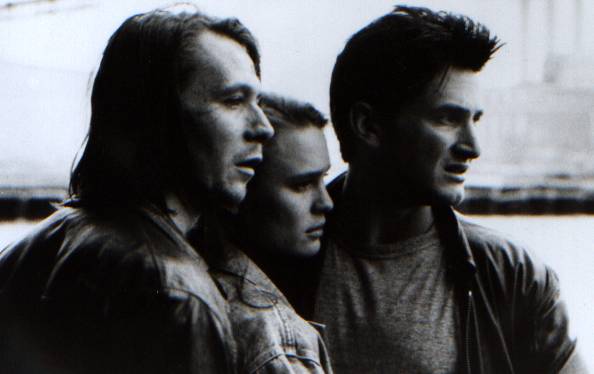 from an acting teacher/friend (from Brooklyn) who referenced it upon learning of
a job I'd landed at the time, which required rehearsals in Queens (and if you
haven't yet seen the film to catch that reference, yes, that means Queens is a
place of which he was less than fond). Second,
I have to myself reference a more recent film, (covered a bit further down this
page), Ash Wednesday. At the time I first ran across this
later work, I found it curious that Ed Burns had departed so completely from his
usual fare of contemporary relationship explorations to return to the 1980's and
New York City's Irish mob for this particular effort -- and wondered as I
watched what might have inspired such a drastic change.
from an acting teacher/friend (from Brooklyn) who referenced it upon learning of
a job I'd landed at the time, which required rehearsals in Queens (and if you
haven't yet seen the film to catch that reference, yes, that means Queens is a
place of which he was less than fond). Second,
I have to myself reference a more recent film, (covered a bit further down this
page), Ash Wednesday. At the time I first ran across this
later work, I found it curious that Ed Burns had departed so completely from his
usual fare of contemporary relationship explorations to return to the 1980's and
New York City's Irish mob for this particular effort -- and wondered as I
watched what might have inspired such a drastic change.
Not long after the ending credits had rolled on State of
Grace, however, I realized it was very possible Burns had been as taken as I by
what transpired in the 2+ hours leading up to them. And, it's therefore
likewise
possible his own tale of two brothers in Hell's Kitchen might have sprung from
the words "what if" regarding certain aspects of this one.
Be that as it may, it certainly seems likely
Burns has at some point seen this fil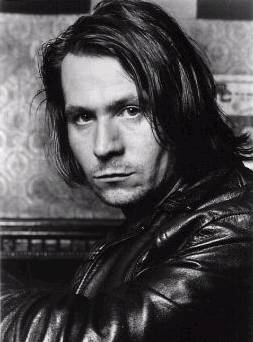 m...which is more than I can say for the
"professional" critics whose reviews I looked into after seeing it myself -- the most glaringly inaccurate of which
labeled one of
its main characters "psychotic". Interestingly, that character
-- Jackie Flannery (impeccably played by Gary Oldman) --
while indeed quite possible "crazy" (as he himself professes) -- is
the one whose actions are almost invariably followed by the assumedly sane
"lead", Terry Noonan
(played by the likewise excellent Sean Penn). Interesting as well is the fact that a major component of
psychosis is said to be a lack of
real attachment to other people, along with which goes an inability to relate in
any real way to their feelings, feel compassion for them in return, etc.
Yet, it is arguably the fact this particular character feels too much that
proves his greatest "weakness"...one which indeed makes him dangerous
-- though it's likewise arguable this weakness poses the greatest danger to
himself.
m...which is more than I can say for the
"professional" critics whose reviews I looked into after seeing it myself -- the most glaringly inaccurate of which
labeled one of
its main characters "psychotic". Interestingly, that character
-- Jackie Flannery (impeccably played by Gary Oldman) --
while indeed quite possible "crazy" (as he himself professes) -- is
the one whose actions are almost invariably followed by the assumedly sane
"lead", Terry Noonan
(played by the likewise excellent Sean Penn). Interesting as well is the fact that a major component of
psychosis is said to be a lack of
real attachment to other people, along with which goes an inability to relate in
any real way to their feelings, feel compassion for them in return, etc.
Yet, it is arguably the fact this particular character feels too much that
proves his greatest "weakness"...one which indeed makes him dangerous
-- though it's likewise arguable this weakness poses the greatest danger to
himself.
I suppose one can follow the logic of the critics, however,
if one merely takes at face value all events as they unfold, and
if one merely dismisses Jack as one of the stereotypical, murderous miscreants that
populate so many "run-of-the-mill" crime dramas. Of course, such
"logic" completely ignores the myriad of scenes in which
the character appears, the bulk of which present an irrepressible
individual whose generosity, caring and steadfast friendship quickly thwart the
"best laid plans" that have suddenly brought Terry home.
Make no mistake, however; Jackie Flannery is no
saint. He himself states at one point that, as a part of his
"job", he "hurts people" (another interesting irony to
which, however, is that throughout the first half of the film he invariably
approaches physical combat in a strictly hand to hand manner; it is the supposedly more "controlled" Terry who repeatedly
pulls a gun.) After all, Jackie is a product of a culture steeped in blood
-- both shared and shed -- and he clearly accepts the violence and death
that are a part of his survival. Yet he also clearly retains an uncharacteristic level of
respect, compassion, and almost childlike joy in living for what one conceives
of as a "thug". As the saying goes, "Love covers a multitude of
sins",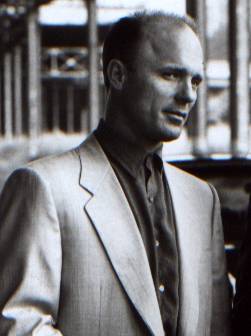 and it remains an undeniable fact of Jack's character that this sinner
is above all else a creature filled with love.
and it remains an undeniable fact of Jack's character that this sinner
is above all else a creature filled with love.
What's more, a major driving force behind this love
seems
an astonishing level of hope. And, it's both the characterization and importance of Jackie's love and
hope that the aforementioned professional critics have failed to understand.
Roger Ebert, for example, so completely missed the point that he described what
is arguably the key scene depicting the fiercely determined nature of these
qualities with the words, "[Jackie's] idea of making arson into fun is to pour the
gasoline between himself and the door, and then see if he can run through it
without killing himself." Not exactly.
Rather, when Jack breaks Terry in on his first
"assignment" (working for Jackie's older brother Frank, the Irish mob's
current leader) he likewise attempts to share with him the belief there
are possibilities beyond their life of 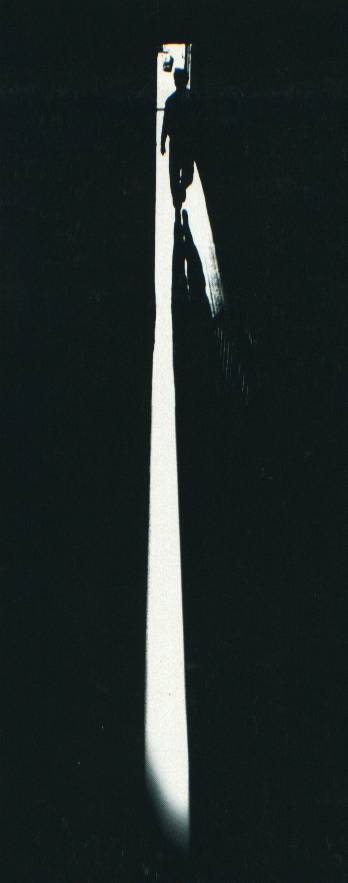 crime -- and offers this belief as an
invitation, patiently awaiting Terry's assent before creating a mock
"hell" of very real flames from which he and Terry escape via a fiery
"hundred yard dash". And, in so doing, it seems very likely that Jack's mission is not merely to create "fun",
but much more, to offer Terry the seeds of his own faith in one day escaping --
together --
the greater Hell that is at present their real life in Hell's
Kitchen. (...and
proving in the process he's by no means a person to seek the "easy way
out" of a difficult situation).
crime -- and offers this belief as an
invitation, patiently awaiting Terry's assent before creating a mock
"hell" of very real flames from which he and Terry escape via a fiery
"hundred yard dash". And, in so doing, it seems very likely that Jack's mission is not merely to create "fun",
but much more, to offer Terry the seeds of his own faith in one day escaping --
together --
the greater Hell that is at present their real life in Hell's
Kitchen. (...and
proving in the process he's by no means a person to seek the "easy way
out" of a difficult situation).
Again, in fairness to the critics, though (as the above
scene indicates), so many of the
film's most meaningful themes are presented metaphorically -- no one is hit over
the head with directly idealogical dialogue by any means....which is a part of
what makes this film so deceptive in its lasting appeal. One is simply on the
edge of one's seat as tensions mount and actions build, and it's only as bits
and pieces settle into one's consciousness over time that the enormity of what
has been experienced is permitted to seep in. As a result,
it's debatable whether the entirety of the arson scene's meaning is clear even to
Terry at the time it's taking place, as the reasons for and implications of his
return to the neighborhood after a twelve year absence (which are not revealed until much later) necessarily
provide a somewhat different perspective -- at first. As time goes on,
however, the lasting truth that seeps into Terry's consciousness is one
described in the Proverb, "there is a friend who sticks closer than a
brother". And, it's the bond of Terry's and Jack's friendship that
ultimately defines Terry's character...eventually leading him to conclude there
may be no such thing as the state of grace he'd once conceived, and lending him
the courage to seek out his own form of redemption.
Moonlight
Mile
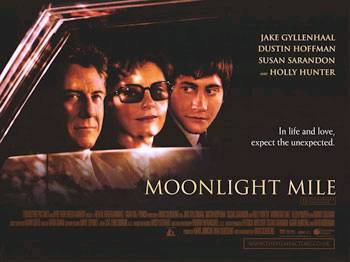 While searching for a couple of photos with which to augment this review, I ran
across a bit of commentary describing Moonlight Mile as "a
tender and touching tale of loss and the power of human connection"
-- a wonderfully concise capturing of the picture's essence, I tend to
think. To offer a few more specifics, however, I should perhaps mention
first that I saw bits and pieces of an interview with the film's creator, Brad
Silberling, at the time it was initially released back in 2002. And, as I
quickly gathered its origins stemmed from the 1989 murder of his
then-girlfriend, actress Rebecca Scheaffer, I mistakenly assumed it would most
likely be a tale rife with unrelenting gloom. That said, I'm sure I
would have passed it by when it appeared on TV a few weeks back, were it not for
the glowing recommendation for it I'd received from a friend only days
before.
While searching for a couple of photos with which to augment this review, I ran
across a bit of commentary describing Moonlight Mile as "a
tender and touching tale of loss and the power of human connection"
-- a wonderfully concise capturing of the picture's essence, I tend to
think. To offer a few more specifics, however, I should perhaps mention
first that I saw bits and pieces of an interview with the film's creator, Brad
Silberling, at the time it was initially released back in 2002. And, as I
quickly gathered its origins stemmed from the 1989 murder of his
then-girlfriend, actress Rebecca Scheaffer, I mistakenly assumed it would most
likely be a tale rife with unrelenting gloom. That said, I'm sure I
would have passed it by when it appeared on TV a few weeks back, were it not for
the glowing recommendation for it I'd received from a friend only days
before.
The theme of life's mixed bag of highs and lows --
sometimes even joy glimpsed through the tears of tragedy -- is hinted at even in
the film's opening scenes, in which we watch a grieving family en route to their
 daughter's
funeral -- and see through their car windows a glowing bride and groom emerge
from a church they pass along the way. This juxtaposition of darkness and
light permeates the film, and it is arguably the struggle between these forces
-- and which will be the one the characters ultimately embrace, that forms the
story's underpinning of deeply personal conflict.
daughter's
funeral -- and see through their car windows a glowing bride and groom emerge
from a church they pass along the way. This juxtaposition of darkness and
light permeates the film, and it is arguably the struggle between these forces
-- and which will be the one the characters ultimately embrace, that forms the
story's underpinning of deeply personal conflict.
Set in the Vietnam era, the film centers around Joe
(Jake Gyllenhaal), the fiance of a young woman named Diana, who was killed for
essentially no other reason than being in the wrong place at the wrong
time (caught in the -- quite literal -- crossfire of two strangers' deadly
domestic dispute). Adding to the difficulties of coping with such a random
act of violence, Diana's parents attempt to hang onto her by now hanging onto
Joe, who takes up residence in their home and, almost without realizing he's
done so, agrees to go into the commercial real estate business with Diana's father
(Dustin Hoffman). Uncomfortable with his new place in their family, and
aware that at some point life must begin again for all of them, Joe chafes under
this stricture, yet in the hopes of giving back some small portion of the peace
and happiness so swiftly and brutally stolen from this unfortunate couple, he
endures their plans for his future -- until, that is, he begins to form a few
plans of his own.
In the process, secrets unfold on various levels,
revealing more and more bits of character, and providing more and more reasons
to emerge from the sleepwalking world of grief in which the characters mentioned
above -- and a new character (played
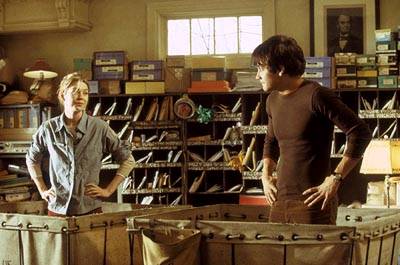 to
perfection by newcomer Ellen Pompeo) who enters Joe's life --
reside.
to
perfection by newcomer Ellen Pompeo) who enters Joe's life --
reside.
Moreover, throughout the personal events with which
each character struggles individually (recovery from alcoholism, career unrest,
conflicting loyalties, et. al.), collectively they struggle with the common
pursuit of bringing Diana's killer to justice -- a feat their sympathetic yet
highly focused lawyer insists depends upon bringing Diana to life within the
courtroom. And, it is indeed Joe's ability to do precisely this which sets
before them all a re-evaluated definition of what that word justice really
means...and sets before them as well a choice between love and hate, truth or
wishful thinking...and ultimately the bitterness of a living death, or the
fullness -- "warts and all" -- of life itself.
That said, I must confess it was not a matter of choice
that this film quickly joined those already in the category of my all-time
favorites. Rather, it was arguably that aforementioned "power of
human connection" -- between the audience and the characters within this
film -- that, quite unexpectedly, placed it on this list of its own
accord. But don't take my word for it...journey this Moonlight
Mile for yourself and discover the bittersweet joy you're likely to catch
sight of through its tears -- or more accurately, through yours.
Ash
Wednesday
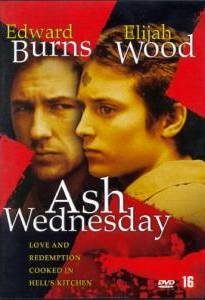 While
flipping through the cable channels one night, this crime drama appeared on the
screen, already in progress...and while that circumstance alone would normally
prompt me to keep flipping, I immediately put the remote down upon spotting Ed Burns
(you may recall I've mentioned
elsewhere on this page Burns is a long-established fave of mine...in all of his
identities -- i.e. actor, writer and director. In fact, one of my all-time
favorite movie lines was penned by him and appears in a scene from She's
The One. If you haven't seen that film, it's about two brothers and
a sibling rivalry that leads the younger to begin an affair with the elder's
former fiancee. Throughout the film, the adulterous brother's wife
frantically searches for the reasons he's ceased all romantic interest in (and
activities with) her. In attempting to explain this to his father at one
point, the much more perceptive -- not to mention much more blunt -- dad says, "Let
me get this straight. You don't want to cheat on your girlfriend with your
wife." A perfect description of a perfectly ludicrous situation.)
While
flipping through the cable channels one night, this crime drama appeared on the
screen, already in progress...and while that circumstance alone would normally
prompt me to keep flipping, I immediately put the remote down upon spotting Ed Burns
(you may recall I've mentioned
elsewhere on this page Burns is a long-established fave of mine...in all of his
identities -- i.e. actor, writer and director. In fact, one of my all-time
favorite movie lines was penned by him and appears in a scene from She's
The One. If you haven't seen that film, it's about two brothers and
a sibling rivalry that leads the younger to begin an affair with the elder's
former fiancee. Throughout the film, the adulterous brother's wife
frantically searches for the reasons he's ceased all romantic interest in (and
activities with) her. In attempting to explain this to his father at one
point, the much more perceptive -- not to mention much more blunt -- dad says, "Let
me get this straight. You don't want to cheat on your girlfriend with your
wife." A perfect description of a perfectly ludicrous situation.)
Back to this film, however, it soon became apparent
that again Burns has used the relationship dynamic of two brothers as the core
of his onscreen tale. This time, however, there's the added twist of
it appearing that Burns' character, Francis, had actually killed his
brother, Sean (Elijah Wood) after Sean had killed three men he'd overheard
plotting to kill Frances.
Sound complicated? It is. Particularly when
you throw in the Irish and Italian mobs functioning in this 1980's version of
New York City....the former of which includes Francis as a member. And,
when someone looking suspiciously like Sean starts appearing at various spots in
his old neighborhood, questions arise regarding whether he's suddenly risen from
the dead...or if, in fact, he never died. Throw in a priest known to be a
close friend of the brothers' family, Sean's wife who has moved on in what
proves a most conflict-inspiring direction -- not to mention members of both
mobs still seeking vengeance for their murdered comrades -- and the result is,
well, perhaps not quite a top-notch thriller (nor a screenplay quite up to
Burns' usually exceptional standards), but definitely a tale filled with more
than its share of interesting characters and nail-biting suspense.
The most glaring flaw, from my perspective, is the
casting of Elijah Wood in the role of Sean. For, even though it isn't
outside the realm of possibility that the 30+ Francis might have a 21 or
22-year-old sibling, there's the implication of a normal sibling dynamic that
could only reasonably exist if the two were much closer in age. For
example at one point, they discuss their memories of growing up together, each's
perceptions of which brother the parents' favored, etc., that really have no
relevance given the unusually large separation.
Be that as it may, at first blush it seems the film is
called Ash Wednesday merely because the bulk of its events take place on
that day of a particular year, and recall events that took place on that same
day three years past. And, having arrived at this assumption, a scene
describing the day's theological significance may seem something of an odd note
to include in a crime drama at the time its taking place. Ultimately, however,
the scene serves to point up the key concept of the film: it's the very
moment in which we think ourselves the safest that proves the one in which we
are instead the very most at risk. And while I'm sure an at times
profane and violent film isn't the type of illustration most commonly offered to
make this concept real to those observing such a holy day's rituals, by the time
the ending credits roll, I'd nonetheless be willing to bet Ash Wednesday's
deeply serious meaning is a lesson you'll never forget.
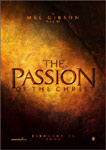 The
Passion of the Christ
The
Passion of the Christ
I think it's
important to preface my remarks about this film with three factors that play
very strongly into my "critique" of it. First, it should be
noted that I'm familiar with and fully believe in the material on which it's
based. Second, while I, of course, could not avoid discussions involving friends
and family members who already had or wished to see the film, I made a point of
not reading any professional reviews, nor listening to interviews with Mel
Gibson or other participants in the making of the picture. Thirdly, I
approached the experience at the outset from a completely objective point of
view...i.e. with an open mind regarding its potential merits or failures as both
a religious "experience", if you will, and as a "mere" work
of filmmaking art.
That said, I should add as well that prior to seeing
the film myself, I defended what I understood it contained of graphic material
(although I am unabashedly squeamish and therefore avoid such material at any
and all times possible in my "normal" filmgoing experiences). And, the
reason for this defense, of course, is that I do agree with the importance of
dealing honestly with the truly horrific suffering Jesus undoubtedly endured
throughout the final hours of his earthly life...a
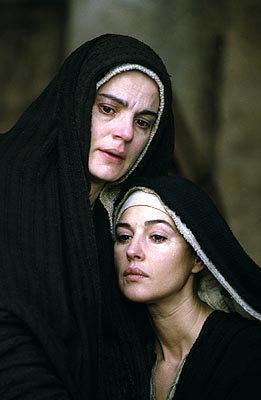 suffering,
moreover, the scriptures on which this film are based teach us he chose
to endure because of his great love for Mankind. With that in mind, I
entered the theater fully aware that I was about to see a film filled with a
much greater brutality level than that to which I am accustomed.
suffering,
moreover, the scriptures on which this film are based teach us he chose
to endure because of his great love for Mankind. With that in mind, I
entered the theater fully aware that I was about to see a film filled with a
much greater brutality level than that to which I am accustomed.
And, frankly, I thought the film started out with a
great deal of promise. I found the scenes in the Garden of Gethsemane both
moving and fraught with both real and dramatic tension. I agreed
completely with the choice to let us hear a subtext that could only be conveyed
via the languages of the day while allowing us to read the text itself through
the effective use of subtitles. And, I was very greatly impressed by the
insight viewers were offered into the perspective of Jesus' mother. For,
while
of course her presence is made known on this fateful day in brief passages of
scripture, this film allows us the unique opportunity to follow her throughout
the various stages of the unfolding events, and to deeply contemplate the pain,
the sorrow -- indeed, truly, the horror -- that surely characterized this
darkest of all days for an amazing woman with whom is most often associated
the word, "blessed".
I believe it is likewise to the production's credit
that Pontius Pilate is (along with his wife) portrayed as such a well-drawn and
believable human character. His inner conflict as a ruler and sympathetic
nature as a man offer an objective voice of reason attempting to balance the
heat of misplaced religious fervor...a task many objective voices yet today find
a not always achievable task.
But the film loses credibility for me as the punishment
of Jesus begins, and continues...and continues...and continues....and continues
even more -- to a point that eventually drives out one's sense of compassion and
horrified awe, replacing them instead with alternating numbness and anger -- the
latter of which, I might add, had for me by this time started shifting
irrevocably in the direction of Mel Gibson rather than the characters turned
caricatures reveling with sadistic glee in their appointed
"task". Not only is the scene of Jesus' flogging unbelievably
lengthy and brutal to a point it seems arguable he never would have survived
long enough to actually be crucified, but from a purely common sense
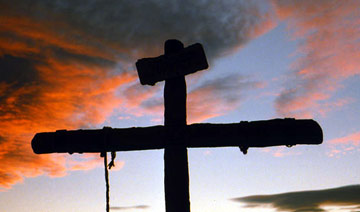 perspective,
it seems illogical to me that these Roman soldiers would have really cared
enough to bother being nearly so "thorough" in carrying out their
duties as the film far more than merely implies. In other words, it is my
understanding that the "crimes" of which Jesus was accused were in
fact crimes at all only (or at least primarily) in the eyes of the Jewish
leadership; Pilate himself appeared to have little, if any, prior acquaintance
with Jesus' activities...and how much less of a vendetta, then, would it seem
likely the mere soldiers under Pilate's command would have borne against this
man? At the same time, obviously, the fact these soldiers routinely
carried out floggings and crucifixions speaks for itself in that they were
clearly understood to be a brutal and uncaring lot. But to assume they
treated Jesus as much more harshly as they are repeatedly shown to do than they
did the prisoners crucified at the same time as Jesus, for example, raises
severe questions regarding not merely why this should be the case, but why Mel
Gibson would present such a seemingly skewed and ultimately self-defeating
perspective.
perspective,
it seems illogical to me that these Roman soldiers would have really cared
enough to bother being nearly so "thorough" in carrying out their
duties as the film far more than merely implies. In other words, it is my
understanding that the "crimes" of which Jesus was accused were in
fact crimes at all only (or at least primarily) in the eyes of the Jewish
leadership; Pilate himself appeared to have little, if any, prior acquaintance
with Jesus' activities...and how much less of a vendetta, then, would it seem
likely the mere soldiers under Pilate's command would have borne against this
man? At the same time, obviously, the fact these soldiers routinely
carried out floggings and crucifixions speaks for itself in that they were
clearly understood to be a brutal and uncaring lot. But to assume they
treated Jesus as much more harshly as they are repeatedly shown to do than they
did the prisoners crucified at the same time as Jesus, for example, raises
severe questions regarding not merely why this should be the case, but why Mel
Gibson would present such a seemingly skewed and ultimately self-defeating
perspective.
That said, to touch briefly on the fears expressed
prior to the film's release that it might prompt outbreaks of anti-Semitism in
its unsympathetic portrayal of the Jewish people, I think (and am very glad to
have observed) that such fears are unfounded. The scenes involving the
Jewish Simon of Cyrene, who helped Jesus carry the cross, for example, offer a
wonderfully full portrait of the finest in humanity, as do those of other such
exemplary Jewish characters dotted throughout the film. Based on the prior
description of the Roman soldiers' behavior, however, it wouldn't seem to me
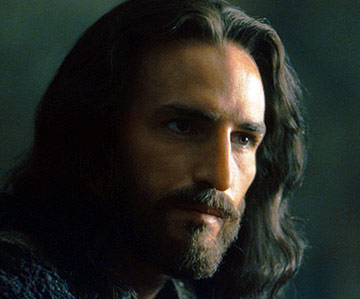 unjust
in the least if the citizens of that city were to (very loudly) voice complaint.
unjust
in the least if the citizens of that city were to (very loudly) voice complaint.
In summation, I'd have to say that my overwhelming
feeling about this film is an unmitigated sense of injustice -- not to mention
just plain sorrow -- as I can't help but believe that in the final analysis what
may now be the most famous depiction ever of arguably the most clearly tangible
moments of Christ's great love are presented in this film via means of
hate. Moreover, his teachings, his miracles, the proofs of the
aforementioned great love as lived by him throughout his days on earth (and
predominantly his three years of ministry), are reduced to miniscule flashbacks
-- and what's worse, many of which it is likely make no sense to those coming to
this film as their first introduction to the details of Jesus'
life. Since, as I said initially, I have not heard Gibson's
own explanations regarding the various decisions by which he proceeded with
creation of this film, by openly criticizing his "achievement" on this
page I am not herein questioning his intent; I am, however, personally
disappointed by his judgment. As one review I read after seeing the film
noted, "it's a shame he has no faith in audiences to feel Jesus' pain
without rubbing their noses in it." For, indeed, by taking this
approach, ultimately, "his Passion emerges as something [wholly]
contrary to Jesus' spirit: unforgiving."
And to that I can only say... Amen.

I'm not sure where to
begin what one might call a "review" of this film. After all,
how does one "rate" an experience that draws the viewer in so
completely as a participant in the most profound complexities that characterize
the mental, physical and emotional adjustments that are the affects of war (and
the one particularly intimate aspect of war this work primarily deals with)...leaving him or her to sort out, just as the characters
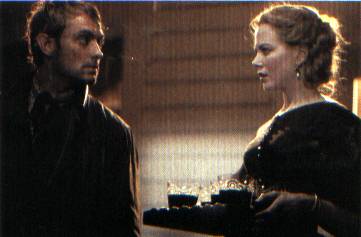 remaining at the end of the story must do, what he or she is left with?
It's a powerful dilemma, to be sure. And, just as swift and sweeping changes in one's life often
require a bit of time and distance -- a bit of healing, one might say -- to make
sense of them in any way, so
this is a film that
requires one to step back a pace from the numbing events that follow so
swiftly upon themselves in order to separate any cohesive intellectual
meaning from the overwhelming sense of pain and uselessness that are arguably
one's instinctive, and purely visceral, reaction.
remaining at the end of the story must do, what he or she is left with?
It's a powerful dilemma, to be sure. And, just as swift and sweeping changes in one's life often
require a bit of time and distance -- a bit of healing, one might say -- to make
sense of them in any way, so
this is a film that
requires one to step back a pace from the numbing events that follow so
swiftly upon themselves in order to separate any cohesive intellectual
meaning from the overwhelming sense of pain and uselessness that are arguably
one's instinctive, and purely visceral, reaction.
Superbly directed by
Anthony Minghella, and acted by a stellar cast that includes supporting
performances
by Renee Zellweger (in a role both comically forthright and touchingly
vulnerable), Philip Seymour Hoffman as a wayward preacher, and an unforgettable
Natalie Portman as a young war widow, Cold Mountain offers a balanced
view of both the soldier's plight and the profound changes in life on the home
front. Contrary to its television advertising, however, the essence of the film
is not merely a deeply moving love story, but perhaps might be more aptly
described as a truly brilliant study in character. 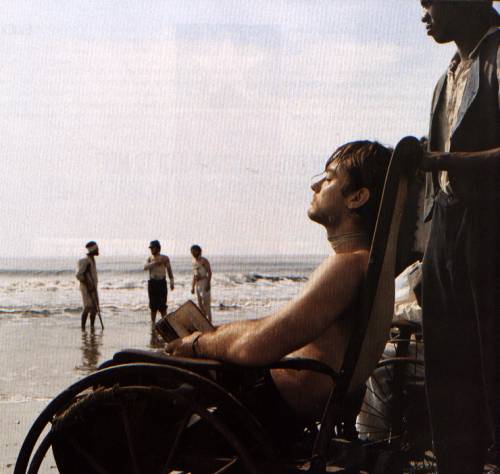 As the wounded Inman
(played to haunting perfection by Jude Law) makes his way back to the lovely Ada
(Nicole Kidman), it is largely a matter of how both he and those he encounters
react to the various situations that bring them together which determines
whether he will indeed achieve his goal in finally reaching her. It is
also a matter of Ada's character (and the character of their love, subtly
compared at one point to that of Cathy and Heathcliff in Bronte's Wuthering
Heights) that determines whether she is still to be found at Cold Mountain
when he arrives. And, it is likewise a matter of character (i.e. the ways
in which each has allowed the war to -- and not -- change them) that will decide
their ultimate fate.
As the wounded Inman
(played to haunting perfection by Jude Law) makes his way back to the lovely Ada
(Nicole Kidman), it is largely a matter of how both he and those he encounters
react to the various situations that bring them together which determines
whether he will indeed achieve his goal in finally reaching her. It is
also a matter of Ada's character (and the character of their love, subtly
compared at one point to that of Cathy and Heathcliff in Bronte's Wuthering
Heights) that determines whether she is still to be found at Cold Mountain
when he arrives. And, it is likewise a matter of character (i.e. the ways
in which each has allowed the war to -- and not -- change them) that will decide
their ultimate fate.
Moreover, although the film is set during (primarily
the final year of) the American Civil War, it is not a "Civil
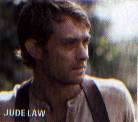 War"
film, per se, at all. The political issues at the heart of the conflict
are really never touched on in any depth, and it is not a belief in "the
cause" by any means that takes Inman away. In fact, when gently
accused by Ada's peace-favoring father (Cold Mountain's new Reverend) of the
same misguided fervor toward some holy pursuit shared by the majority of his
contemporaries, Inman mildly notes that he "expects God is weary of being
called down on both sides" of a fight. And, after years of fighting
and the senseless bloodshed that finally leave him seriously wounded, far from
his beloved homeland and his beloved at home, Inman himself eventually grows
weary of the conflict and takes up arms to fully engage in the one battle he's
always believed in -- true love.
War"
film, per se, at all. The political issues at the heart of the conflict
are really never touched on in any depth, and it is not a belief in "the
cause" by any means that takes Inman away. In fact, when gently
accused by Ada's peace-favoring father (Cold Mountain's new Reverend) of the
same misguided fervor toward some holy pursuit shared by the majority of his
contemporaries, Inman mildly notes that he "expects God is weary of being
called down on both sides" of a fight. And, after years of fighting
and the senseless bloodshed that finally leave him seriously wounded, far from
his beloved homeland and his beloved at home, Inman himself eventually grows
weary of the conflict and takes up arms to fully engage in the one battle he's
always believed in -- true love.
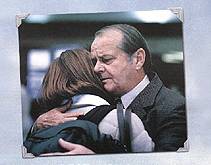

If you love great acting,
you'll want to see this film for the performance by Jack Nicholson alone.
And, indeed, that performance pretty much is the film. For, nearly
every frame deals with some aspect of self-discovery on the part of the title
character. In fact, one might easily say that more than being "about
Schmidt", rather the story consists almost solely of his own discoveries as
to "what Schmidt's about". And, in the process, of course,
Warren R. Schmidt also learns what others are about, what life's about...and how
these all tie together.
The film opens with Warren's retirement from his job as
vice-president at an Omaha, NE insurance firm. Having defined his
"self" and his purpose in life largely through his work, he suddenly
finds himself without a routine, without a purpose, and with instead a lot of
not merely unanswered, but rather unasked, questions. While flipping
through the channels from the clearly uncomfortable position of an easy chair,
Warren stops at an advertisement for "Childreach", a sponsorship
program for underprivileged children and their families in Africa.
Moved by the images of expressive doe-like eyes and tiny half-naked bodies
surrounded by dire poverty, he picks up the phone to pledge $22/month for the care
of his very own "foster" child.
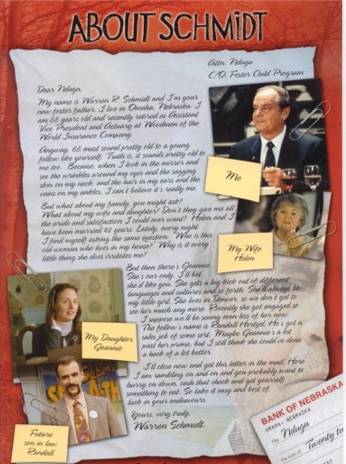 A few days later, an information packet arrives, along
with a photo of "his" child, Ndugu, and a request that the new
"parent" send a letter of introduction along with his
contribution. In greater need of someone to share with than he himself at
first realized, Warren quickly begins taking advantage of this ongoing
opportunity to share his true feelings about many topics, feelings he's unable
to share with those around him back "home" in the U.S. And,
ultimately, this charitable act that seems at first a small aspect of his life
-- in fact, that seems more a clever means of allowing the screenwriter to share
some needed exposition than anything else-- turns out to be a wonderfully subtle
yet significant plot device as well.
A few days later, an information packet arrives, along
with a photo of "his" child, Ndugu, and a request that the new
"parent" send a letter of introduction along with his
contribution. In greater need of someone to share with than he himself at
first realized, Warren quickly begins taking advantage of this ongoing
opportunity to share his true feelings about many topics, feelings he's unable
to share with those around him back "home" in the U.S. And,
ultimately, this charitable act that seems at first a small aspect of his life
-- in fact, that seems more a clever means of allowing the screenwriter to share
some needed exposition than anything else-- turns out to be a wonderfully subtle
yet significant plot device as well.
As very little happens, really, in terms of genuine action,
the bulk of the film's interest lies in what seem such "little things"
-- quirky habits, chance and yet routine encounters, etc. After Warren's
car breaks down, for instance, he starts driving his enormous Winnebago (in
regard to which vehicle he tells his daughter, "I was willing to go as far
as the 'Mini-Winnie', but no,
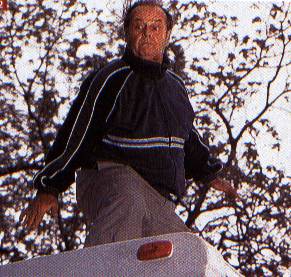 your
mother had to have the 'Adventurer'!") on even minor errands. Later,
we see him sipping soda from a 44-ounce convenience store cup while chatting
with a Native American proprietor, a visit that prompts him to share with Ndugu
in his next letter that these people "really got a raw deal".
While staying with his daughter's future in-laws he's introduced to sleeping in
a waterbed, and nearly drowns in heretofore unseen sights all too common in this
obliviously strange household headed up by the future mom-in-law, Roberta (the
always truly amazing Kathy Bates).
your
mother had to have the 'Adventurer'!") on even minor errands. Later,
we see him sipping soda from a 44-ounce convenience store cup while chatting
with a Native American proprietor, a visit that prompts him to share with Ndugu
in his next letter that these people "really got a raw deal".
While staying with his daughter's future in-laws he's introduced to sleeping in
a waterbed, and nearly drowns in heretofore unseen sights all too common in this
obliviously strange household headed up by the future mom-in-law, Roberta (the
always truly amazing Kathy Bates).
Ostensibly, Warren's journey is undertaken so he might
get to know his soon-to-be-married daughter better, a plan that very quickly
goes awry. Unbeknownst to him, however, by this time he's already begun
the process of getting to know yet another familiar stranger...himself.
And, while he's not sure at times that he's so fond of this particular
acquaintance, ultimately he's surprised to learn that Warren R. Schmidt has
lived a life of more significance than the average Joe -- or rather, the average
"Schmidt" this film's "about" -- would've ever
thought.
Life Or Something Like It
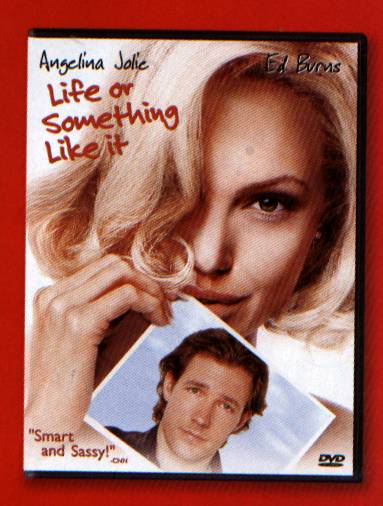 Although this film stayed in theaters for all of about 12 seconds (and was given
a far less than glowing 1-star review in Premiere magazine), I've gotta
say I absolutely loved it. Obviously, the fact that it starred two of my
favorite actors didn't hurt its initial appeal...however, it was the combination
of smart, witty dialogue, a well-paced plot, and, yes, the characteristically
wonderful performances of Angelina Jolie and Edward Burns that left me
completely satisfied with the work overall by the time the credits
rolled.
Although this film stayed in theaters for all of about 12 seconds (and was given
a far less than glowing 1-star review in Premiere magazine), I've gotta
say I absolutely loved it. Obviously, the fact that it starred two of my
favorite actors didn't hurt its initial appeal...however, it was the combination
of smart, witty dialogue, a well-paced plot, and, yes, the characteristically
wonderful performances of Angelina Jolie and Edward Burns that left me
completely satisfied with the work overall by the time the credits
rolled.
Young, upwardly mobile Seattle TV reporter Lanie
Kerrigan has what she considers the perfect life...great looks, a great job
that's about to springboard her to an even better one (on the national TV
morning show, AM USA), a famous baseball player fiance -- everything.
Until that is, she's sent (along with her cameraman, Pete...a flannel-shirted
everyman played to perfection by Burns) to interview the homeless "Prophet
Jack", a local "psychic" who's less than confidence inspiring
catchphrase is "I see, I say, you pay". Yeah, he sounds
reliable, right?
Well, that's what Lanie thinks, too -- at first.
When the two predictions he offers as part of the interview come to pass with
eerie precision, however, she begins to question whether the third should be
taken a bit more seriously -- the third being "and next Thursday you're
going to die."
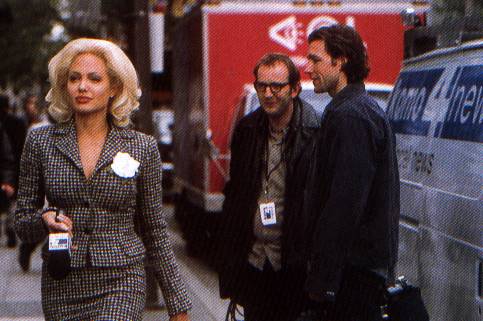 With the possibility of it imminently ending, suddenly Lanie wonders if her life
is indeed so perfect after all. And within days of this pronouncement, her
re-examination of it prompts her to "define life" anew...and wonder if
what she has is really life at all -- or perhaps just something like it.
With the possibility of it imminently ending, suddenly Lanie wonders if her life
is indeed so perfect after all. And within days of this pronouncement, her
re-examination of it prompts her to "define life" anew...and wonder if
what she has is really life at all -- or perhaps just something like it.
There are indeed a few pretty glaring flaws -- arguably
the worst of which is a phone conversation that takes place between Lanie and
her fiance on the evening she first learns she may be about to die. The
dialogue is completely contrived -- ridiculous really, and the fiance character
proves pretty much equally under-developed/annoyingly "stock"
throughout his remaining scenes.
The snappy lines between Lanie and Pete (particularly
those that take place in the "payoff scene", if you will, near the end
of the film) more than make up for this, however, helped largely by the sheer
likeability of Burns' portrayal. And a clever metaphor using Altoids is, for my
taste anyway, the stuff that surely makes one writer smile to have thought of it
and another watching applaud the inspired moment of a comrade.
It's been a while since I finished watching a movie and
immediately wished I could start watching it all over again -- 'til this one
came along. And if only it hadn't been due back at the video store today,
I'd probably be doing just that right now instead of talking about it here!
But hey, that means there's one more copy available for
you to rent this very night. So go check it out yourself...and by all
means, enjoy!!!
Moulin Rouge
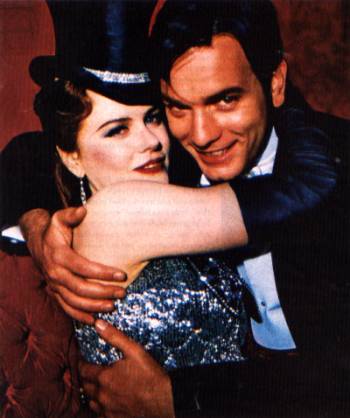 In light of all the positive things I'd heard about this film and my already
long-established appreciation for the work of Ewan MacGregor, I'm not sure why
it took me so long to get around to actually watching it. Although once
I'd started, I've gotta admit I wasn't sure for quite some time if I shouldn't
have waited longer...I always find the unnatural vehicle of almost solely
musical speech a bit off-putting to begin with, and coupled with the
determinedly campy approach to much of the film, I really wasn't sure if my
final impression of it would turn out all that positive. Boy, was I
wrong! Despite the contrivances, once you allow yourself to buy into the
simple story of a tragic love affair, I dare you to resist the charm and
believability of the protagonists and their affections. And albeit perhaps
insanely innocent and naive, the hopeless romantic in me couldn't help but love
the idea of the simple song the lovers offer each other in times of doubt and
difficulty as a reassurance of their lasting bond..."Never knew I could
feel like this, like I've never seen the sky before...Come what may, come what
may, I will love you until my dying day."
In light of all the positive things I'd heard about this film and my already
long-established appreciation for the work of Ewan MacGregor, I'm not sure why
it took me so long to get around to actually watching it. Although once
I'd started, I've gotta admit I wasn't sure for quite some time if I shouldn't
have waited longer...I always find the unnatural vehicle of almost solely
musical speech a bit off-putting to begin with, and coupled with the
determinedly campy approach to much of the film, I really wasn't sure if my
final impression of it would turn out all that positive. Boy, was I
wrong! Despite the contrivances, once you allow yourself to buy into the
simple story of a tragic love affair, I dare you to resist the charm and
believability of the protagonists and their affections. And albeit perhaps
insanely innocent and naive, the hopeless romantic in me couldn't help but love
the idea of the simple song the lovers offer each other in times of doubt and
difficulty as a reassurance of their lasting bond..."Never knew I could
feel like this, like I've never seen the sky before...Come what may, come what
may, I will love you until my dying day."
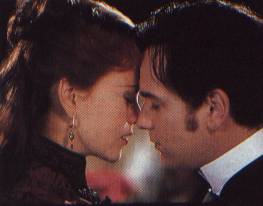 It seems that via the aforementioned appreciation for
his work, Ewan MacGregor is one actor who invariably leads me down cinematic
paths I'd likely never travel without him (The Pillow Book, Little Voice,
Eye of the Beholder, etc.). And seldom, if ever, have I regretted such a journey.
Unfortunately, it seems in too many of these instances he's ended up impressing
me most with his ability to very convincingly -- and tearfully -- convey a
painful loss. Yet the thing that makes him great in my eyes is his ability
to not merely convey these losses, but more importantly, make me share in
them...not to mention their accompanying tears. And considering Moulin
Rouge proved not the exception, but arguably an archetype in the level of
joint participation in grief it ultimately inspired, one might wonder whether
the decision to finally watch it was such a great one after all. But if
you've seen it yourself, you already know the answer to that. And if
you haven't...well, what are you waiting for?! For, Moulin Rouge is a
place I definitely recommend you visit -- "come what may..."
It seems that via the aforementioned appreciation for
his work, Ewan MacGregor is one actor who invariably leads me down cinematic
paths I'd likely never travel without him (The Pillow Book, Little Voice,
Eye of the Beholder, etc.). And seldom, if ever, have I regretted such a journey.
Unfortunately, it seems in too many of these instances he's ended up impressing
me most with his ability to very convincingly -- and tearfully -- convey a
painful loss. Yet the thing that makes him great in my eyes is his ability
to not merely convey these losses, but more importantly, make me share in
them...not to mention their accompanying tears. And considering Moulin
Rouge proved not the exception, but arguably an archetype in the level of
joint participation in grief it ultimately inspired, one might wonder whether
the decision to finally watch it was such a great one after all. But if
you've seen it yourself, you already know the answer to that. And if
you haven't...well, what are you waiting for?! For, Moulin Rouge is a
place I definitely recommend you visit -- "come what may..."
Waking the Dead
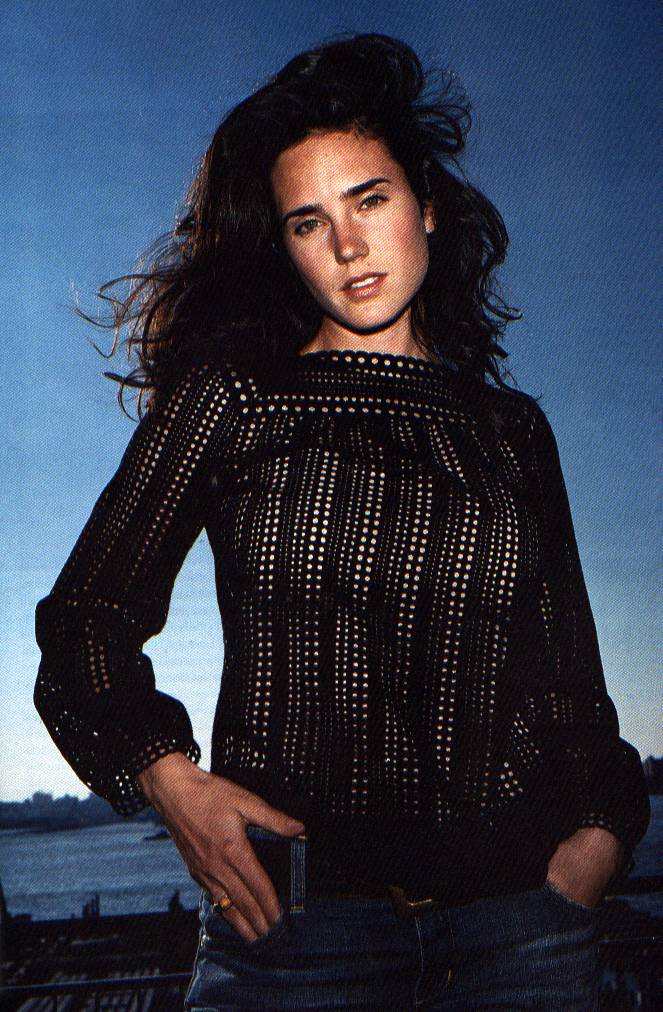 I was first drawn to this film by a preview on a
video my husband and I rented some time ago. So, when it appeared in the
listings for Showtime recently I decided to at last satisfy my
curiosity. And am I ever glad I did!
I was first drawn to this film by a preview on a
video my husband and I rented some time ago. So, when it appeared in the
listings for Showtime recently I decided to at last satisfy my
curiosity. And am I ever glad I did!
The film opens with Fielding Pierce's discovery that his
girlfriend, Sara, has been killed while working with a church group helping
victims of a politically oppressive regime escape from Chile in the
mid-1970's. It then jumps 10 years ahead to a time of emotional
crisis as a series of events lead him to question whether in fact she really
died.
Using flashbacks to unveil the tangled layers of the
relationship Fielding and Sara shared and to help us understand the man he has
since become, the film explores the reasons people of disparate backgrounds and
ambitions are both brought together and, too often, torn apart.
After accepting an opportunity to run for Senate, the
always politically ambitious Fielding finds his campaign jeopardized through a
series of encounters in which he believes to have seen Sara. Torn between
the certainty of his own insanity and the hope that her death was in fact a
governmentally arranged hoax, Fielding tries to reconcile the political pawn he
has become with the person of character Sara knew he had always been. In a
pivotal scene she attempts to illustrate for him the disservice he is committing
against both the himself and the people he claims his political ambitions will
assist. "Don't become a cog in the machine," she pleads.
"Why not?" he counters testily. "Sometimes cogs make
machines run more smoothly." "Sometimes," she
replies. "But usually they just go in circles, wear out and get
replaced."
And indeed as the
campaign progresses Fielding finds these circles tightening and his mental
stability wearing very thin.
Featuring an excellent cast led by Billy Crudup and
Jennifer Connelly, this film would be worth watching for the performances
alone. Crudup is truly unsettling as a character edging ever closer to the
brink of insanity, and Connelly is beautifully affecting as a young woman of
empathy and conviction. Coupled with the genuine conflict of a difficult
relationship and even more difficult separation, the reasons for watching are
even that much more numerous and compelling. In short, this is just
"good stuff" -- well written, well acted and very well worth
watching. By all means, check it out!
A Beautiful Mind
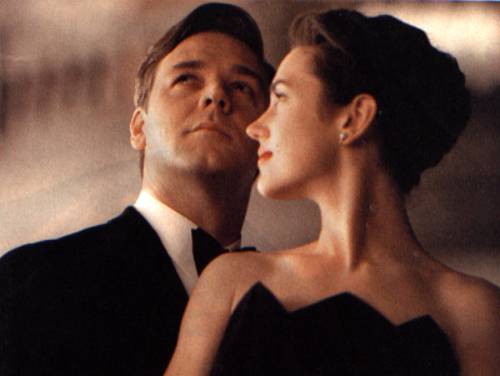 Recounting the tale of the genius mathematician, John Nash, from his college
days in 1947 through his acceptance of the Nobel Prize in 1994, this is neither
a stuffy biography nor a comfortingly rosy triumph-over-tragedy story with a
conventional happy ending. Rather, it is a frighteningly realistic and
accessible portrait of one man's mental illness and the toll it exacts on both
him and his wife. It is also a portrait of strength, patience, discipline
and an unparalleled determination to overcome simply by refusing to be
overcome by forces beyond one's control.
Recounting the tale of the genius mathematician, John Nash, from his college
days in 1947 through his acceptance of the Nobel Prize in 1994, this is neither
a stuffy biography nor a comfortingly rosy triumph-over-tragedy story with a
conventional happy ending. Rather, it is a frighteningly realistic and
accessible portrait of one man's mental illness and the toll it exacts on both
him and his wife. It is also a portrait of strength, patience, discipline
and an unparalleled determination to overcome simply by refusing to be
overcome by forces beyond one's control.
I read in a newspaper article before seeing this film
that it's a shame in retrospect Russell Crowe won the Best Actor Oscar last year
(not that he was undeserving of that honor) since having done so may preclude
his truly extraordinary, indeed even more deserving efforts in this film from
being likewise recognized. And now that I've seen his performance
for myself I must agree. Not only does Crowe portray Nash's descent into
insanity and beyond with enviable credibility, but he likewise balances Nash's
most negative personality traits (and at times quite excessive ego) with an
underlying humanity that somehow keeps the audience at all times squarely on his
side -- no small feat for one who introduces himself to a Princeton colleague by
commenting on the complete ugliness of his tie and whose romantic approach to a
first date consists of an inquiry into precisely how soon they might have
intercourse (which wins him, incidentally, a well-deserved -- and very hard --
slap across the face).
In conclusion, I can only add that even after seeing
the film I'm not sure I consider "A Beautiful Mind" the best title to
accurately describe the nature of the main character or his truly trying
journey...especially since it is ultimately understood that real victory -- even
over mental illness -- is more a matter of the heart. Even so, I'm
absolutely certain I consider this a beautiful film...even though the particular
form of beauty it reveals is by no means at all times a pretty sight.
Vanilla Sky
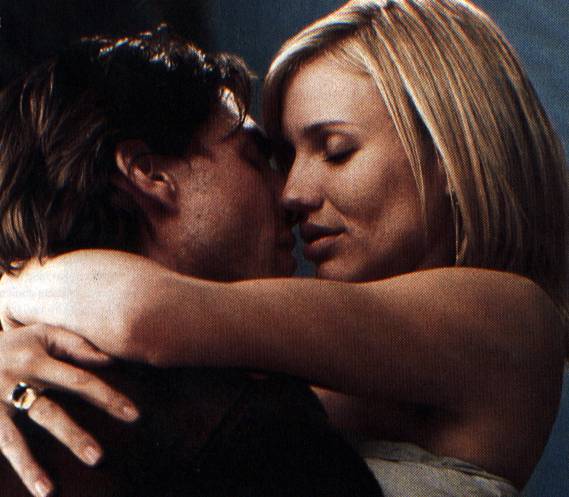 I read in a magazine article that director Cameron
Crowe's purpose in making Vanilla Sky was two-fold: to explore the
consequences of casual sex and comment on the influence of pop-culture on our
self-image. And while I wouldn't argue that he completely missed the
target on both counts by any means, I do have to contend that I somehow feel
these aims could have been more effectively -- and interestingly -- achieved if
gone about using a more direct and realistic approach.
I read in a magazine article that director Cameron
Crowe's purpose in making Vanilla Sky was two-fold: to explore the
consequences of casual sex and comment on the influence of pop-culture on our
self-image. And while I wouldn't argue that he completely missed the
target on both counts by any means, I do have to contend that I somehow feel
these aims could have been more effectively -- and interestingly -- achieved if
gone about using a more direct and realistic approach.
At the same time, I can see how such a complex and
bizarre journey as that undergone by the film's main character would prove a
draw to an actor in search of unusual challenges, and beyond question Tom Cruise
proved himself more than up to the task -- alternating playing on his
stereotypical leading man appeal and embarking on territory that pits him
strongly against type. The supporting cast likewise handles the difficult
material very competently -- which probably explains one not completely losing
interest when the plot begins to become clear (or completely unravel, depending
on one's point of view) in a twist of psychological science-fiction that
stretches the inherent bond between an audience willing to suspend disbelief and
a director attempting to metaphorically deliver truth perhaps a bit too close to
the breaking point.
Be that as it may, there are indeed a few excellent
moments and, of course, an obligatory nugget of obvious wisdom, which
perhaps explains the choice to release the film so close to the approach of a
new year and its accompanying onslaught of resolutions: "every
passing moment is another chance to turn it all around"...a sentiment with which I do
actually very much agree, but one which having been uttered in this particular
film left me strongly tempted to go buy a ticket to another (and hopefully
better) movie before I'd even left the theater.
Autumn In New York
 I
have to preface my discussion of this film by saying I don't believe I'd heard
or read one positive word about it prior to actually watching it on a pay-tv-channel
recently. With that in mind, I'm not sure why exactly I felt so compelled
to see it in the first place. But after doing so I was far more concerned
with attempting to figure out why it had been so universally panned as I have to
admit I really thought it was just plain excellent -- at least in most respects.
I
have to preface my discussion of this film by saying I don't believe I'd heard
or read one positive word about it prior to actually watching it on a pay-tv-channel
recently. With that in mind, I'm not sure why exactly I felt so compelled
to see it in the first place. But after doing so I was far more concerned
with attempting to figure out why it had been so universally panned as I have to
admit I really thought it was just plain excellent -- at least in most respects.
That said, I would have to agree with dissenters that
neither the excessive age difference between the two main characters nor the
plot contrivance of the heroine's terminal illness were necessary to convey or
in any way bolster the overall point of the film, which is essentially that
while inherently involving at times incomprehensible risk nonetheless love
itself is the ultimate victory.
I realize, of course, that this is a rather
common theme in literature and films, but what set it apart in this particular
case was an uncommon exploration of certain character elements that prevent many
from ever "finding" love -- or more accurately the choices that
sabotage love before it can reach anything approaching maturity.
Specifically, it explains the motivation of fear underlying the apparently
careless immorality of the womanizer played by Richard Gere, and offers a very
believable transformation in his character toward the beginnings of courage,
accountability and ultimately acceptance -- of both the scoundrel those around
him have long since become accustomed to him being, and more importantly, the
human being he is at last allowing himself to become.
Almost
Famous (Best Original Screenplay Winner)
 I must confess I approached this film with a bit of skepticism, and in fact
resisted it during its run at the local theater. Somehow a memoir about
the director's days as a rock-n-roll journalist in the seventies evoked images
of a cross between a big-screen version of "That Seventies Show"
and a self-indulgent journey in search of his own lost youth -- neither of which
made me exactly giddy with anticipation. After having it recommended many
times over by various friends and relatives, however, my husband and I finally
found ourselves quite eagerly awaiting its home-video release, and I have to
admit we rushed out to rent it as soon as it became available. And
contrary to my misguided pre-judgment (something you'd think we'd all learn one
day that most pre-judgments are) I quickly found myself very pleasantly
surprised. Even before the story really started to draw me in, I became
hooked on the fine acting of Frances McDormand and Philip Seymour Hoffman.
In fact, I even enjoyed the opening credits sequence wherein a hand shown in
close-up wrote the names of cast and crew on a ruled pad, a technique intercut
with various images of objects/memorabilia that quickly established the
setting.
I must confess I approached this film with a bit of skepticism, and in fact
resisted it during its run at the local theater. Somehow a memoir about
the director's days as a rock-n-roll journalist in the seventies evoked images
of a cross between a big-screen version of "That Seventies Show"
and a self-indulgent journey in search of his own lost youth -- neither of which
made me exactly giddy with anticipation. After having it recommended many
times over by various friends and relatives, however, my husband and I finally
found ourselves quite eagerly awaiting its home-video release, and I have to
admit we rushed out to rent it as soon as it became available. And
contrary to my misguided pre-judgment (something you'd think we'd all learn one
day that most pre-judgments are) I quickly found myself very pleasantly
surprised. Even before the story really started to draw me in, I became
hooked on the fine acting of Frances McDormand and Philip Seymour Hoffman.
In fact, I even enjoyed the opening credits sequence wherein a hand shown in
close-up wrote the names of cast and crew on a ruled pad, a technique intercut
with various images of objects/memorabilia that quickly established the
setting.
More significantly, it was fascinating how completely
Cameron Crowe managed to keep the audience squarely focused on the main
character's viewpoint, sharing in his alternate anxiety and wonder while still
allowing each of the other characters to likewise unfold very completely before
our eyes (in some cases before they began fully unfolding before his) -- thereby
effectively creating a whole, and wholly believable world threatened at every
turn by the conflicting needs and desires of parental concern, the loyalty --
and betrayal -- of friends and the confusion of romance. A particularly
memorable scene in an aircraft threatened by a storm both underscores this theme
and serves to bring tensions brewing just below the surface most effectively to
light.
Best of all, just when it seems the end isn't going to
turn out at all as one has been led to believe, events take yet another
unexpected turn to make things end up...not at all as expected. If you
haven't seen the film and find that conclusion a little hard to make sense of,
that's excellent...as you'll have to rent the video to find out what it
means. I encourage you to do just that. It may be called
"Almost Famous" , but compared to so much of what passes for
filmmaking these days, it's more than "almost" fantastic.
Erin
Brockovich (Best Actress Winner, Julia Roberts)
 Obviously, the subject matter of this film -- namely the story of a
community's residents grievously wronged by a polluting power company's
deception -- and the enormous efforts (on the community's behalf) exerted by the
true-life heroine after
which it takes its name make the real-life participants in this drama worthy of some type of award (or many awards) in and
of themselves. Speaking strictly from a filmmaking perspective, however,
I'm not convinced the same applies to Erin Brockovich, the movie.
Although the material is certainly handled competently and the acting is
top-notch, I don't know that there is much besides sentiment to raise it above
the "everyman" vs. "evil corporation" theme that has been
used at least a hundred times before (Norma Rae most notably comes to
mind). By that I mean I tend to think of Oscar-caliber films as
somehow groundbreaking or at least less ordinary...although I admit that must
seem to represent something of a confused viewpoint since I tend to adore
"classic" tales or films based on "classic" literature (Of
Mice and Men, The Cider House Rules, Cyrano DeBergerac, etc.), most of which
not only recount common themes but appear in more than one film version based on
the exact same work. At the same time, the works I believe truly
"Oscar-worthy" tend to be "bigger" somehow (Braveheart,
Gladiator) or even smaller (as in more intimate -- such as
Obviously, the subject matter of this film -- namely the story of a
community's residents grievously wronged by a polluting power company's
deception -- and the enormous efforts (on the community's behalf) exerted by the
true-life heroine after
which it takes its name make the real-life participants in this drama worthy of some type of award (or many awards) in and
of themselves. Speaking strictly from a filmmaking perspective, however,
I'm not convinced the same applies to Erin Brockovich, the movie.
Although the material is certainly handled competently and the acting is
top-notch, I don't know that there is much besides sentiment to raise it above
the "everyman" vs. "evil corporation" theme that has been
used at least a hundred times before (Norma Rae most notably comes to
mind). By that I mean I tend to think of Oscar-caliber films as
somehow groundbreaking or at least less ordinary...although I admit that must
seem to represent something of a confused viewpoint since I tend to adore
"classic" tales or films based on "classic" literature (Of
Mice and Men, The Cider House Rules, Cyrano DeBergerac, etc.), most of which
not only recount common themes but appear in more than one film version based on
the exact same work. At the same time, the works I believe truly
"Oscar-worthy" tend to be "bigger" somehow (Braveheart,
Gladiator) or even smaller (as in more intimate -- such as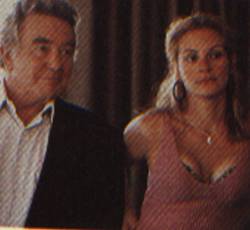 the 1992 Gary Sinise version of Of Mice and Men) -- or
perhaps somehow both at the same time (The Green Mile, for
example). Like great actors, great films have some indefinable yet
unmistakable quality that makes them something (or someone) you truly come to
know or experience rather than merely watch, that makes them something you may
never need to see more than once to see time and again throughout the rest of
your life (the Robert Downey, Jr. film Less Than Zero comes to
mind). They have something that makes them special, something that makes
them -- well...great. Erin Brockovich is good. In
fact, it's very good. As for why I don't believe it's "great",
to be honest I can't really say...I only know that if it truly were I wouldn't
have to.
the 1992 Gary Sinise version of Of Mice and Men) -- or
perhaps somehow both at the same time (The Green Mile, for
example). Like great actors, great films have some indefinable yet
unmistakable quality that makes them something (or someone) you truly come to
know or experience rather than merely watch, that makes them something you may
never need to see more than once to see time and again throughout the rest of
your life (the Robert Downey, Jr. film Less Than Zero comes to
mind). They have something that makes them special, something that makes
them -- well...great. Erin Brockovich is good. In
fact, it's very good. As for why I don't believe it's "great",
to be honest I can't really say...I only know that if it truly were I wouldn't
have to.
Feel free to let me know how you feel about this
perspective and, of course, to share your own on the Share
The Insanity Discussion Board.
Crouching Tiger, Hidden Dragon (Best Foreign Language Film Winner)
 In light of all the attention this film has received in recent weeks, I must
confess I went to the theater with pretty high expectations. And maybe
these contributed to the less than wild enthusiasm I felt upon leaving.
Yet while the themes of living the time we have on earth to the fullest and
remaining true to ourselves despite myriad temptations to be led astray are
effectively conveyed, still somehow the film as a whole failed to really move or
impress me.
In light of all the attention this film has received in recent weeks, I must
confess I went to the theater with pretty high expectations. And maybe
these contributed to the less than wild enthusiasm I felt upon leaving.
Yet while the themes of living the time we have on earth to the fullest and
remaining true to ourselves despite myriad temptations to be led astray are
effectively conveyed, still somehow the film as a whole failed to really move or
impress me.
I suppose my single greatest objection really centers
around the complete disregard of reality with respect to the fight
sequences. As a longtime fan of the late Brandon Lee and various film and
television productions featuring the martial arts (among my favorites was the
too-shortlived Vanishing Son series starring Russell Wong) -- all
of which I realize also stretched the bounds of real hand-to-hand combat quite
unmercifully -- something in me balks at the sight of people repeatedly running
up and down vertical walls and literally flying through the air like Peter Pan
in what purports itself as somehow a serious film. I realize, too, that
this is all intended for artistic effect, but I still find something much more
admirable in the discipline and artistry (although, of course, not the sometimes
incredibly violent results) of the real thing.
All that aside, the acting is very good, the Chinese
settings often breathtaking and a sequence involving a young girl's adventure
leading into true love is very entertaining. And, obviously, the recent
critical and popular success of the film indicates many disagree with my
assessment of it overall. With that in mind, if you want my advice, go
check it out and decide for yourself -- and don't forget to let me know what you
think by voicing your opinion on the Share
The Insanity Discussion Board.
Hannibal
I suppose I should
first say that I'm definitely the squeamish type. As a result, I avoided The
Silence of the Lambs until just a few weeks ago when I at last succumbed to
an edited version of it on the "Lifetime" channel. Although
still a bit unsettling even in this toned-down form, I must confess that 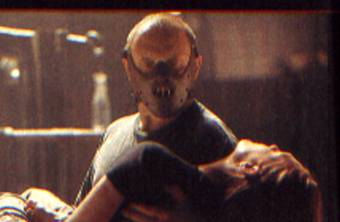 I
found it surprisingly interesting and enjoyable (except, of course, for a couple
instances of incredibly lame dialogue and that end sequence where the killer is
using the night-vision glasses -- I mean, he HAD her...give me a
break!).
I
found it surprisingly interesting and enjoyable (except, of course, for a couple
instances of incredibly lame dialogue and that end sequence where the killer is
using the night-vision glasses -- I mean, he HAD her...give me a
break!).
But I
digress.
Anyway, the point is, having so recently been
introduced to and intrigued by the "sophisticated" cannibal, Lecter,
of course my husband and I rushed out right away to catch this highly
anticipated sequel. And while the character of Hannibal himself again
proved thrilling to watch -- in some very disturbing way -- ultimately the gore
won out, and I have to admit I was grateful to have not eaten a very big lunch
before the matinee since what little I had very nearly ended up on the floor of
the theatre.
That aside, we both agreed that Julianne Moore
represented a huge improvement over Jodie Foster in the role of Clarice
Starling. Despite Foster's considerably greater acclaim, Moore seems to me
a much more interesting actress, even if -- or perhaps because -- not one so
studiedly exact. 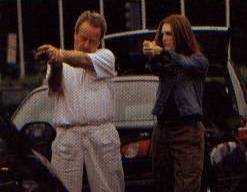 It was also to the film's credit that it carried through with the theory implied
in The Silence of the Lambs regarding Lecter's choice of victims, that he
only destroyed those who were in some way destructive to society themselves --
not that this by any means justifies his actions, of course, but it does remain
the key element in one's perverse desire to see Hannibal remain alive and
uncaptured, which the film clearly aims to again instill in the
audience.
It was also to the film's credit that it carried through with the theory implied
in The Silence of the Lambs regarding Lecter's choice of victims, that he
only destroyed those who were in some way destructive to society themselves --
not that this by any means justifies his actions, of course, but it does remain
the key element in one's perverse desire to see Hannibal remain alive and
uncaptured, which the film clearly aims to again instill in the
audience.
Unfortunately, thanks largely to what I would guess to
be its primary function -- the setup for yet another sequel -- Hannibal
really covers astonishingly little ground. Although it lavishly
sprinkles new garnishes on the already "well-done" title character,
little new substance of any kind is ever revealed. Be that as it may, I
think it's safe to bet that the eerie intonations of Hopkins' "Is that you,
Clarice?" will be featured throughout the nightmares of many
generations to come. At least I'm pretty sure that they'll for too
long be in mine...
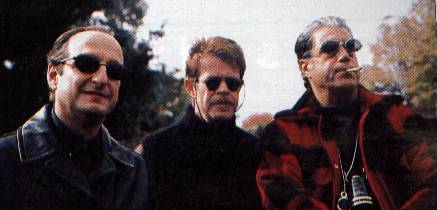
State and Main
But before I get to films
that fall in the above category, I'll just comment quickly on this one which
represents one of my most recent theatergoing experiences -- a choice prompted by
the desire to see another fine performance
by the incredibly talented Philip Seymour Hoffman. And in this regard I
was by no means disappointed. As sensitive, put-upon writer Joe White he
brought a believability to the character which evoked genuine sympathy and provided very necessary grounding to an otherwise
less-than-satisfying film. I'm sure most David Mamet fans will strongly
disagree with this assessment and I completely respect their opinion, indeed welcome
them to even love this picture. To me, however, much of the dialogue
seemed awkward and inadequate, and while I realize the overall spirit is
intended to be highly satirical, I must confess I found the tone overly cynical
instead, and the
injustice of the conclusion more than a little disappointing.
In all fairness, however, I did enjoy selected moments
immensely and appreciated several bits of very telling commentary.
For example, I related to the disrespect with which the writer's
material (indeed, the writer himself) was treated as I've become
increasingly aware that in filmmaking the written word is regarded as far from
sacred. But best of all, who could resist the explanation offered by Joe White's love
interest Anne in response to his musings about why Dalmations became the mascots
of all firemen... "the first fire service was founded in 647 on the border
of Dalmatia and Sardinia. It was either them or the
sardine." Good point...great line.
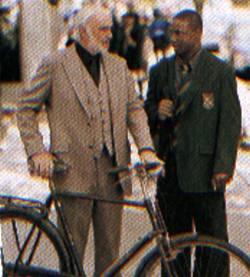 Finding
Forrester
Finding
Forrester
Frankly, I don't
know how to summarize my thoughts on this motivational tale about a gifted young
writer named Jamal and the famous novelist he befriends. While Rob
Brown and Sean Connery (as these characters, respectively) elicit a deep
willingness on the part of the audience to root for them both separately and
together, the movie overall somehow falls short in providing that indefinable
"something" that marks a film you just can't shake and know you'll one
day wish to see again. At the same time, it definitely has its moments,
among my favorite of which occurs when Jamal asks a question about the soup
Forrester has made and switches to a more probing one before getting an
answer. When Forrester does respond he tells Jamal, who has previously
agreed to ask nothing personal of his new friend, that the soup question was a
valid one, inherent with the potential of gaining useful information -- which
should be the main intent of all inquiries. As one might
expect, this qualification resurfaces at a key point later, just after a certain
"failure" on Jamal's part sparks curiosity about what really
happened. Unable to resist, Forrester finally asks him about the matter
point blank. And what's Jamal's response? "That's not exactly a
soup question, is it?" As I said, it may not be a great film, but
you've got to give it some credit for evidences such as this that it at least
aspires to be.
 Hell's Kitchen
Hell's Kitchen
While flipping through
the Showtime package offerings on DirecTV a couple weeks back, my husband and I saw Angelina Jolie
appear on the screen. And, because she is a favorite of ours for the amazing depth of
intelligence, vulnerability -- which when shared honestly in acting I define
"courage" -- and truth she brings to her roles, we stopped to check it
out. It turned out that the film was called Hell's Kitchen and dealt
with the ways in which consequences from a robbery gone bad continue (five years
later) to adversely affect the group of young people who had perpetrated the
crime. The story is told in a very gripping, immediate way, and is
accompanied by a haunting soundtrack which adds to its already considerable emotional weight -- a weight I predict you'll still be feeling long after the
credits roll.
dealt
with the ways in which consequences from a robbery gone bad continue (five years
later) to adversely affect the group of young people who had perpetrated the
crime. The story is told in a very gripping, immediate way, and is
accompanied by a haunting soundtrack which adds to its already considerable emotional weight -- a weight I predict you'll still be feeling long after the
credits roll.
 Return To Paradise
Return To Paradise
A film I consider to be incredibly well-executed
in every way. Not only does it offer excellent insight into the nature of genuine commitment and integrity -- not to mention real compassion
-- but it is also amazingly entertaining for a story centered around subject matter as dark as
the threat of impending death for an unjust criminal conviction. To
understand what I mean, take the restaurant scene wherein Anne Heche's character,
Beth, is yet again attempting to persuade Vince Vaughn's Sherriff
to assist her in her efforts to save their mutual friend. A girl
approaches their booth and throws a very full drink on Sherriff, while ranting
to Beth (with whom he is at this time in no way romantically involved) about how
he will use her, then dump her, etc., which speech the indignant girl closes
with "unless, of course, you're some kind of whore"... A nonplused Beth
responds,
"I'm his wife". Needless to say, this response took the girl
back apace, as it likewise did Sherriff -- and the audience as well.
The Shawshank Redemption
Who could not be
instantly drawn in by the wonderfully expressive voice of Morgan Freeman as he
narrates this tale of injustice, despair, corruption, patience and, well --
redemption. More than simply an inspiring story, this film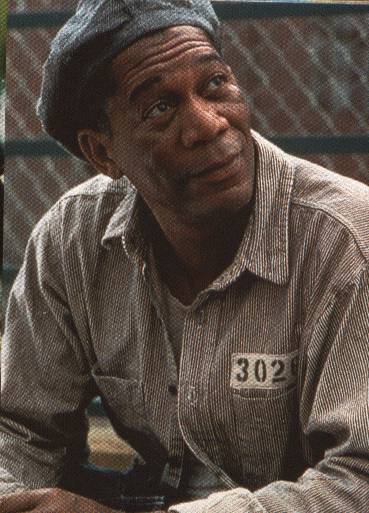 throws down a
challenge to all of us who are at times tempted to cry foul at the evils put
upon us by Fate. Unjustly convicted of murder after finding his wife
involved in an adulterous affair, Andy seemed to have more reason than most of
us could ever claim to shake his fist at God. Rather, he chose to use his
situation for the good of those around him, proving the power of persistence and
the rewards of patience. The summation of his philosophy:
"It's time to get busy livin' or get busy dyin'"...not a
phrase which after its utterance leaves the viewer -- or Andy's friend Red --
feeling exactly cheery. When the meaning of it finally
becomes clear, however, and Red at last comes to fully share its most positive
interpretation, I still tear up every time I hear him speak those words, "I
hope to see my friend again. I hope. I hope." And I can't
help walking away from it with my own hope renewed...no, not merely renewed, but
rather positively
soaring.
throws down a
challenge to all of us who are at times tempted to cry foul at the evils put
upon us by Fate. Unjustly convicted of murder after finding his wife
involved in an adulterous affair, Andy seemed to have more reason than most of
us could ever claim to shake his fist at God. Rather, he chose to use his
situation for the good of those around him, proving the power of persistence and
the rewards of patience. The summation of his philosophy:
"It's time to get busy livin' or get busy dyin'"...not a
phrase which after its utterance leaves the viewer -- or Andy's friend Red --
feeling exactly cheery. When the meaning of it finally
becomes clear, however, and Red at last comes to fully share its most positive
interpretation, I still tear up every time I hear him speak those words, "I
hope to see my friend again. I hope. I hope." And I can't
help walking away from it with my own hope renewed...no, not merely renewed, but
rather positively
soaring.
A few other favorites:
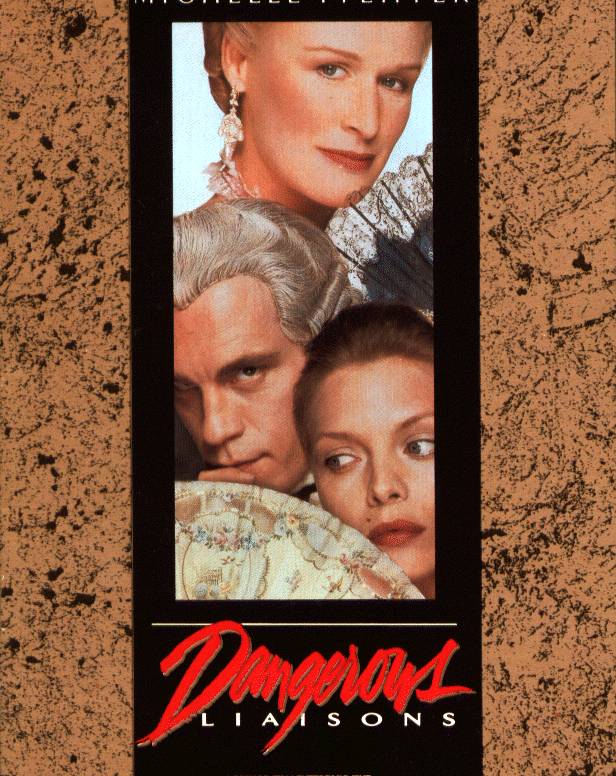
Dangerous Liaisons
(John Malkovich -- at his amazing best!)
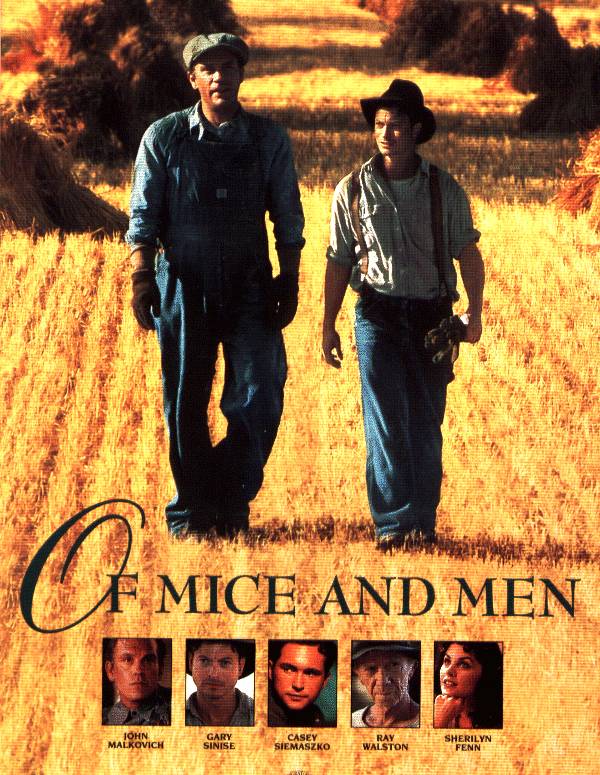
Of Mice and Men
(Gary Sinise, John Malkovich)
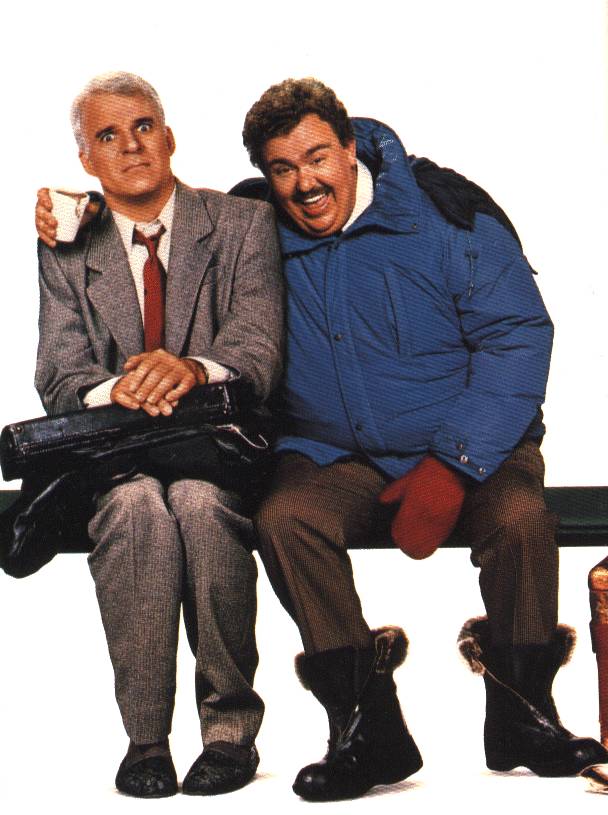
Planes, Trains and Automobiles
(Steve Martin, John Candy)
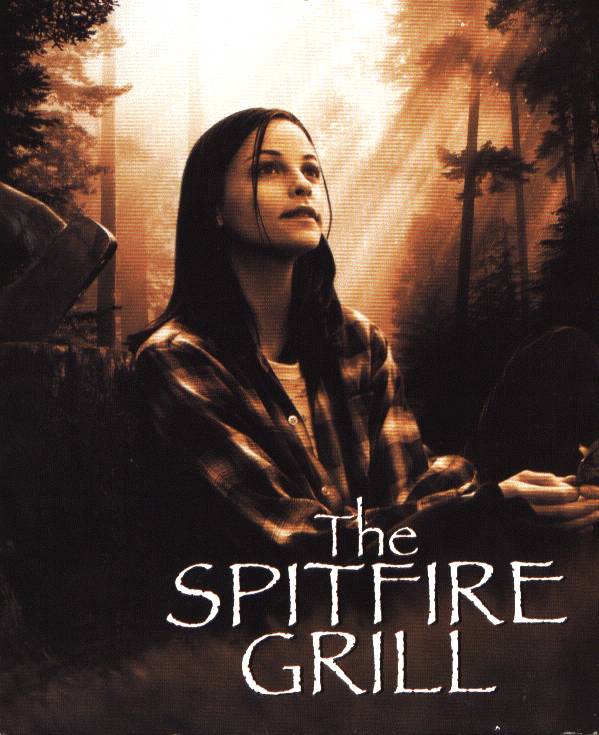
The Spitfire Grill
(Allison Elliot, Ellen Burstyn)
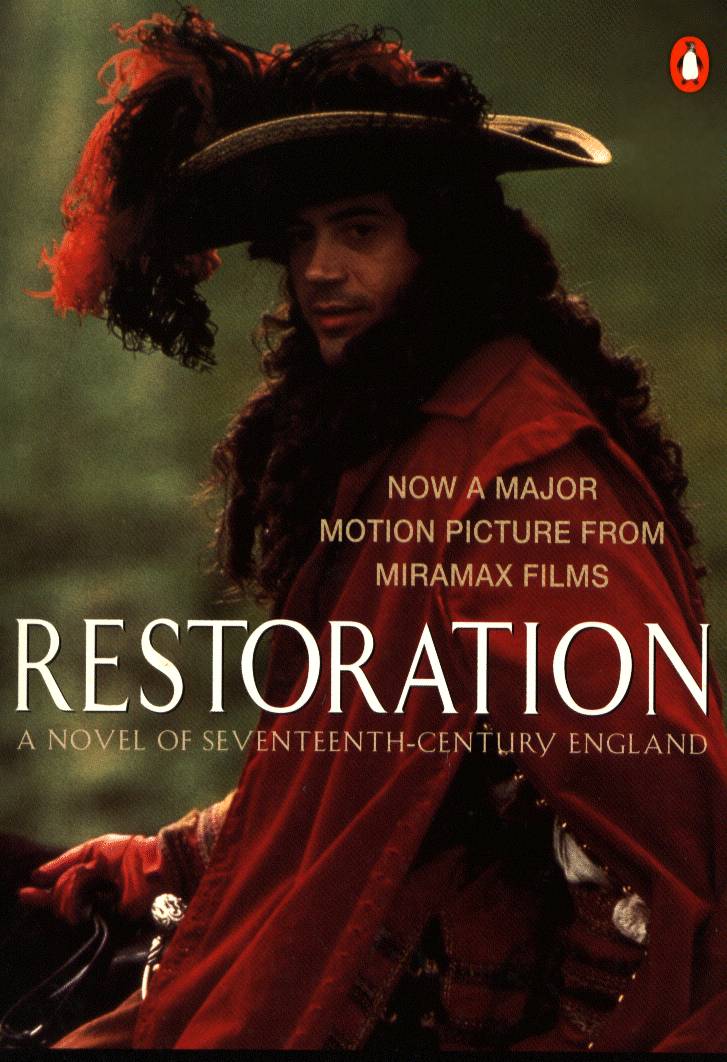
Restoration
(Robert
Downey, Jr., Meg Ryan)
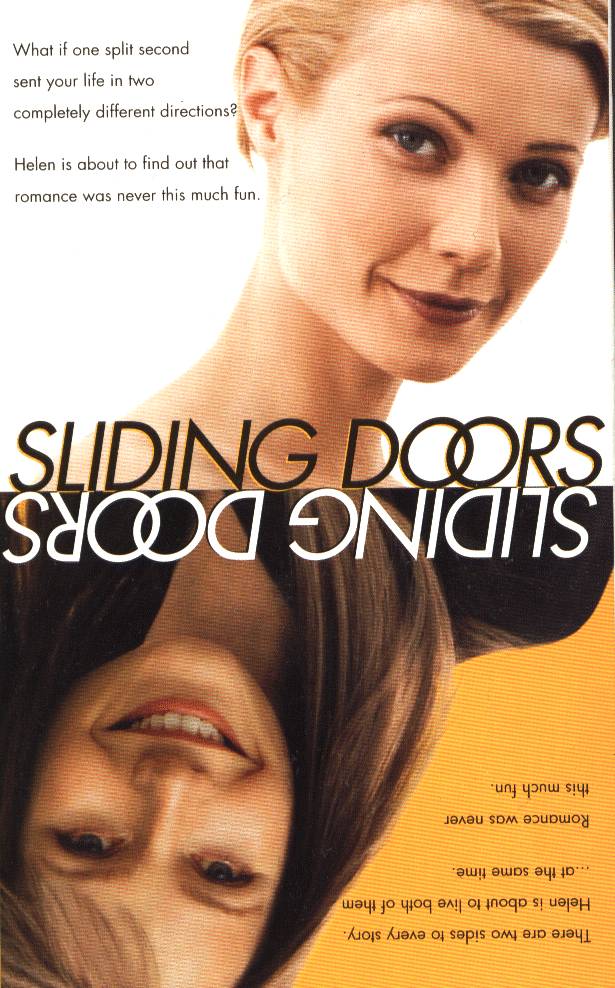
Sliding Doors
(Gwyneth Paltrow, John Hannah)
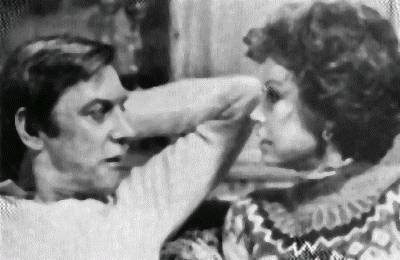
Ordinary People
(Timothy Hutton, Donald Sutherland)
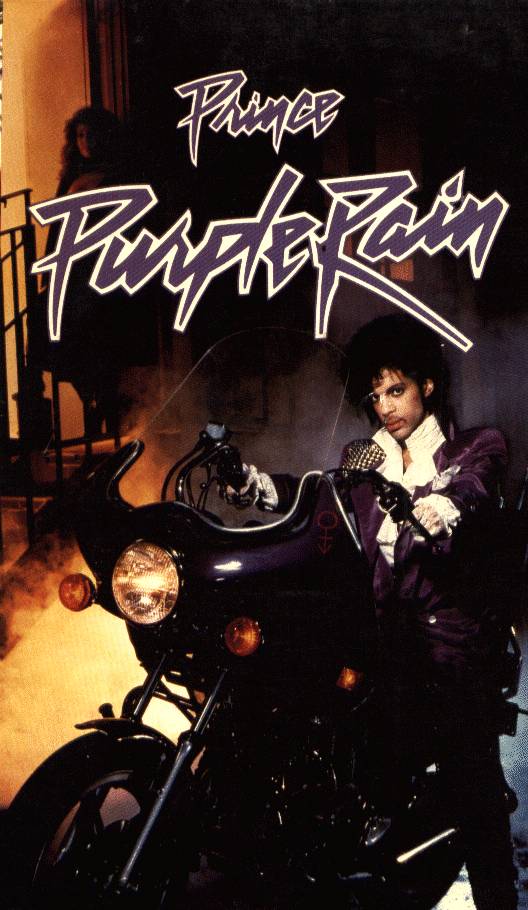
Purple Rain
(Prince)
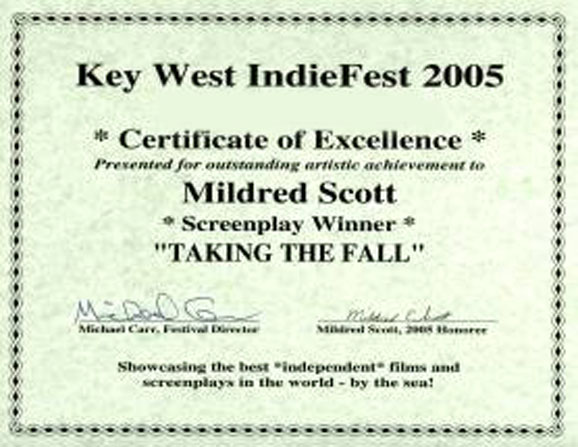
(Favorite Film Not Yet Made)
Taking the Fall
Back
to Top
Back to Mad Ravings On...
